Author: Bao Ngan Nguyen
วันคริสต์มาสเป็นหนึ่งในวันหยุดสำคัญที่รอคอยมากที่สุดแห่งปีซึ่งเป็นโอกาสที่ผู้คนจะได้ใช้เวลากับครอบครัวและเพื่อนฝูง ดังนั้นคำศัพท์วันคริสต์มาสภาษาอังกฤษที่คุณควรรู้อะไรบ้าง มาเรียนรู้กับ ELSA Speak กันเลย
คริสต์มาสภาษาอังกฤษคืออะไร?
- คำอ่าน: Christmas /ˈkrɪsməs/
- เวลา: วันที่ 25 เดือนธันวาคมทุกปี
- ความหมาย: คริสต์มาสเป็นวันเฉลิมฉลองการประสูติของพระเยซูคริสต์ แม้ว่าจะไม่ทราบวันที่แน่นอน แต่ในปี ค.ศ. 274 จักรพรรดิออเรเลียนได้กำหนดให้วันที่ 25 ธันวาคมเป็นวันหยุดเพื่อยกย่องเทพเจ้าแห่งดวงอาทิตย์ของโรมัน อย่างไรก็ตาม ชาวคริสต์ที่อาศัยอยู่ในจักรวรรดินี้ถือว่าพระเยซูคริสต์เป็นศาสดาสูงสุด จึงได้เปลี่ยนวันที่ 25 ธันวาคมแทน นอกจากความหมายตามศาสนาคริสต์แล้ว คริสต์มาสยังเป็นวันหยุดของครอบครัว เป็นวันพิเศษที่ผู้คนทุกชั่วอายุคนในครอบครัวจะได้มารวมตัวกัน การเฉลิมฉลองในทุกรูปแบบนี้สร้างความทรงจำร่วมกันและรักษาความรักใคร่ระหว่างคนในครอบครัว
ตารางคำศัพท์วันคริสต์มาสเป็นภาษาอังกฤษ
คำศัพท์ภาษาอังกฤษเกี่ยวกับวันคริสต์มาส

| คำศัพท์ | คำอ่าน | ความหมาย |
|---|---|---|
| Christmas | /ˈkrɪsməs/ | คริสต์มาส |
| Xmas | /ˈɛks.məs/ | คริสต์มาส (ย่อ) |
| Merry Christmas | /ˈmer.i ˈkrɪs.məs/ | สุขสันต์วันคริสต์มาส |
| A White Christmas | /ə waɪt ˈkrɪsməs/ | คริสต์มาสสีขาว |
| Winter | /ˈwɪntə/ | ฤดูหนาว |
| Santa Claus | /ˈsæntə klɔːz/ | ซานตาคลอส |
| Reindeer | /ˈreɪndɪə/ | กวางเรนเดียร์ |
| Rudolph | /ˈruːdɒlf/ | กวางเรนเดียร์จมูกแดง |
| Santa sack | /ˈsæntə sæk/ | กระสอบของซานต้า |
| Gift/ Present | /ɡɪft/ /ˈprɛzᵊnt/ | ของขวัญ |
| Sled/ Sleigh | /slɛd/ /sleɪ/ | แคร่เลื่อนหิมะ |
| Elf | /ɛlf/ | แคระ |
| Snowman | /ˈsnəʊmən/ | มนุษย์หิมะ |
| Angel | /ˈeɪnʤᵊl/ | นางฟ้า |
| A carol | /ə ˈkærᵊl/ | บทสวด |
| Church | /ʧɜːʧ/ | โบสถ์ |
| Feast | /fiːst/ | งานฉลอง |
| Ritual | /ˈrɪʧuəl/ | พิธีกรรม |
| Wassail | /ˈwɒseɪl/ | การดื่มอวยพรวันคริสต์มาส |
| Chimney | /ˈʧɪmni/ | ปล่องไฟ |
| Snowflakes | /ˈsnəʊfleɪks/ | เกล็ดหิมะ |
| Fireplace | /ˈfaɪəpleɪs/ | เตาผิง |
| Scarf | /skɑːf/ | ผ้าพันคอ |
| Santa hat | /ˈsæntə hæt/ | หมวกซานต้า |
| Boots | /buːts/ | รองเท้าบูท |
| Snowman | /ˈsnəʊmæn/ | มนุษย์หิมะ |
| Christmas Day | /ˈkrɪsməs deɪ/ | วันคริสต์มาส (25/12) |
| Christmas Eve | /ˈkrɪsməs iːv/ | วันคริสต์มาสอีฟ (25/12) |
| Santa Claus Suit | /ˈsæntə klɔːz suːt/ | ชุดซานตาคลอส |

คำศัพท์เกี่ยวกับอาหารคริสต์มาสแบบดั้งเดิม
| คำศัพท์ | คำอ่าน | ความหมาย |
|---|---|---|
| Eggnog | /ˈɛɡnɒɡ/ | นมต้มใส่เหล้า |
| Christmas Candy Canes | /ˈkrɪsməs ˈkændi keɪnz/ | ทอฟฟี่มีรูปร่างเป็นแท่งมักเป็นลายขาวแดง |
| Gingerbread Cookies | /ˈʤɪnʤəbrɛd ˈkʊkiz/ | คุกกี้ขิง |
| Yule log cake | /juːl lɒɡ keɪk/ | เค้กขอนไม้ |
| Christmas Cookies | /ˈkrɪsməs ˈkʊkiz/ | คุกกี้คริสต์มาส |
| Plum cake, fruit cake | /plʌm keɪk/, /fruːt keɪk/ | เค้กพลัม เค้กผลไม้ |
| Christmas pudding | /ˈkrɪsməs ˈpʊdɪŋ/ | พุดดิ้งคริสต์มาส |
| Mulled wine | /mʌld waɪn/ | ไวน์อุ่น |
| Chocolate and Peppermint | /ˈʧɒklət ænd ˈpɛpəmɪnt/ | ช็อคโกแลตและเปปเปอร์มินท์ |
| Sticky toffee pudding | /ˈstɪki ˈtɒfi ˈpʊdɪŋ/ | สติคกี้ทอฟฟี่พุดดิ้ง |
| Brie Cheese | /briː ʧiːz/ | บรีชีส |
| Roast Beef Tenderloin | /rəʊst biːf ˈtɛndəlɔɪn/ | เนื้อสันในย่าง |
| Chocolate bark | /ˈʧɒklət bɑːk/ | ช็อกโกแลตบาร์ค |
| Mashed potatoes | /mæʃt pəˈteɪtəʊz/ | มันฝรั่งบด |
| Baked Ham | /beɪkt hæm/ | แฮมอบ |
| Turkey and Gravy | /ˈtɜːki ænd ˈɡreɪvi/ | ไก่งวงและน้ำเกรวี่ |
| Pecan Pie | /pɪˈkæn paɪ/ | พายถั่วพีแคน |
| Thumbprint Cookies | /ˈθʌmprɪnt ˈkʊkiz/ | คุกกี้นิ้วโป้ง |
| Cranberry Sauce | /ˈkrænbᵊri sɔːs/ | ซอสแครนเบอร์รี่ |
| Roasted Carrots | /ˈrəʊstɪd ˈkærəts/ | แครอทย่าง |
| Brussels Sprouts | /ˈbrʌsᵊlz spraʊts/ | บรัสเซลส์ถั่วงอก |
| Green Bean Casserole | /ɡriːn biːn ˈkæsərəʊl/ | แคสเซอโรลถั่วแขก |
| Dinner Rolls | /ˈdɪnə rəʊlz/ | โรลอาหารค่ำ |
| Mixed Nuts | /mɪkst nʌts/ | ถั่วรวม |
| Green Salad | /ɡriːn ˈsæləd/ | สลัดผักสด |
| Assorted Box of Chocolates | /əˈsɔːtɪd bɒks ɒv ˈʧɒkləts/ | กล่องช็อคโกแลตต่างๆ |

คำศัพท์เกี่ยวกับการตกแต่งในวันคริสต์มาส
| คำศัพท์ | คำอ่าน | ความหมาย |
|---|---|---|
| Christmas card | /ˈkrɪsməs kɑːd/ | การ์ดคริสต์มาส |
| Christmas stocking | /ˈkrɪsməs ˈstɒkɪŋ/ | ถุงเท้าคริสต์มาส |
| Christmas tree/ Pine | /ˈkrɪsməs triː/ paɪn/ | ต้นคริสต์มาส |
| Spruce | /spruːs/ | ต้นสนสกุล |
| Mistletoe | /ˈmɪsltəʊ/ | ต้นกาฝาก |
| Wreath | /riːθ/ | พวงหรีด |
| Ornament | /ˈɔːnəmənt/ | เครื่องประดับ(แขวนอยู่บนต้นคริสต์มาส) |
| Candle | /ˈkændᵊl/ | เทียน |
| Ribbon | /ˈrɪbᵊn/ | ริบบิ้น |
| Curling ribbon | /ˈkɜːlɪŋ ˈrɪbᵊn/ | ริบบิ้นบิด |
| Tinsel | /ˈtɪnsᵊl/ | สิ่งประดับแวววาว |
| Fairy lights | /ˈfeəri laɪts/ | ไฟหยดน้ำ |
| Bell | /bɛl/ | กระดิ่ง |
| Pine cone | /paɪn kəʊn/ | ลูกต้นสนสกุล |
| Wrapping paper | /ˈræpɪŋ ˈpeɪpə/ | กระดาษห่อ |
| Christmas wreath | /ˈkrɪsməs riːθ/ | พวงมาลัยคริสต์มาส |

คำศัพท์ภาษาอังกฤษเกี่ยวกับกิจกรรมในวันคริสต์มาส
| กิจกรรมในวันคริสต์มาส ภาษาอังกฤษ | คำอ่าน | ความหมาย |
|---|---|---|
| Decorate the tree | /ˈdɛkəreɪt ðə triː/ | ตกแต่งต้นไม้ |
| Christmas carols singing | /ˈkrɪsməs ˈkærᵊlz ˈsɪŋɪŋ/ | ร้องเพลงคริสต์มาส |
| Leaving Santa Milk and Cookies | /ˈliːvɪŋ ˈsæntə mɪlk ænd ˈkʊkiz/ | เตรียมนมและคุกกี้สำหรับซานต้า |
| Play family games | /pleɪ ˈfæmᵊli ɡeɪmz/ | เล่นเกมส์ครอบครัว |
| Lighting the advent candles | /ˈlaɪtɪŋ ði ˈædvɛnt ˈkændᵊlz/ | จุดเทียนเพื่อเฉลิมฉลองคริสต์มาส |
| Giving Christmas Gifts | /ˈɡɪvɪŋ ˈkrɪsməs ɡɪfts/ | การให้ของขวัญคริสต์มาส |
| Hanging Christmas stockings | /ˈhæŋɪŋ ˈkrɪsməs ˈstɒkɪŋz/ | แขวนถุงน่องคริสต์มาส |
| Sending Christmas cards | /ˈsɛndɪŋ ˈkrɪsməs kɑːdz/ | ส่งการ์ดคริสต์มาส |
| Go ice skating | /ɡəʊ aɪs ˈskeɪtɪŋ/ | ไปเล่นสเก็ตน้ำแข็ง |
| Make hot chocolate | /meɪk hɒt ˈʧɒklət/ | ทำช็อคโกแลตร้อน |
| Go all out for Christmas Eve dinner | /ɡəʊ ɔːl aʊt fɔː ˈkrɪsməs iːv ˈdɪnə/ | จัดเต็มที่กับมื้อค่ำวันคริสต์มาสอีฟ |
| Cook a Christmas feast | /kʊk ə ˈkrɪsməs fiːst/ | ทำอาหารฉลองคริสตมาส |
| Take a Family Holiday Photo | /teɪk ə ˈfæmᵊli ˈhɒlədeɪ ˈfəʊtəʊ/ | ถ่ายรูปวันหยุดกับครอบครัว |
| Play Holiday Hide-and Seek | /pleɪ ˈhɒlədeɪ haɪd-ænd siːk/ | เล่นซ่อนหาช่วงวันหยุด |
| Pass on Family Heirlooms | /pɑːs ɒn ˈfæmᵊli ˈeəluːmz/ | ส่งต่อมรดกตกทอดของครอบครัว |
| Celebrate La Noche Buena | /ˈsɛləbreɪt lɑː Noche Buena/ | เฉลิมฉลองวันคริสต์มาสอีฟ |
| Grill Prime Rib in the snow | /ɡrɪl praɪm rɪb ɪn ðə snəʊ/ | ซี่โครงเนื้อย่างท่ามกลางหิมะ |
| Wear an ugly Christmas sweater | /weər ən ˈʌɡli ˈkrɪsməs ˈswɛtə/ | สวมเสื้อสเวตเตอร์คริสต์มาส |
| Make paper snowflakes | /meɪk ˈpeɪpə ˈsnəʊfleɪks/ | ทำเกล็ดหิมะจากกระดาษ |
| Organize a secret Santa | /ˈɔːɡᵊnaɪz ə ˈsiːkrət ˈsæntə/ | จัดระเบียบเกม Secret Santa |
| Set Out a Nativity Scene | /sɛt aʊt ə nəˈtɪvəti siːn/ | จัดเตรียมฉากการประสูติ |
| Dress up your pet | /drɛs ʌp jɔː pɛt/ | แต่งตัวสัตว์เลี้ยงของคุณ |

คำศัพท์ภาษาอังกฤษเกี่ยวกับศาสนาที่เกี่ยวข้องกับวันคริสต์มาส
| คำศัพท์ | คำอ่าน | ความหมาย |
|---|---|---|
| Christmas Day | /ˈkrɪsməs deɪ/ | วันคริสต์มาส |
| Christmas Eve | /ˈkrɪsməs iːv/ | วันคริสต์มาสอีฟ |
| Mass | /mæs/ | มวล |
| Jesus | /ˈʤiːzəs/ | พระเยซู |
| The twelve days of Christmas | /ðə twɛlv deɪz ɒv ˈkrɪsməs/ | สิบสองวันแห่งคริสต์มาส |
| Advent | /ˈædvɛnt/ | การสูติของพระเยซู |
| Bethlehem | /ˈbɛθlɪhɛm/ | เมืองที่พระเยซูประสูติ |
| Immanuel | พระเยซูคริสต์ | |
| Epiphany | /ɪˈpɪfəni/ | วันที่พระแม่มารีเสด็จขึ้นสู่สวรรค์ |
| Frankincense | /ˈfræŋkɪnˈsɛns/ | ไม้กฤษณา หนึ่งในสามของขวัญล้ำค่าที่ถวายแด่พระเยซู |
| Gabriel | /ˈɡeɪbriəl/ | นางฟ้าคริสต์มาสชื่อเกเบรียล |
| hallelujah | /ˌhælɪˈluːjə/ | เสียงโห่ร้องด้วยความยินดีสรรเสริญพระเจ้า |
| Joseph | /ˈʤəʊzɪf/ | นักบุญโยเซฟ พระบิดาของพระเยซู |
| Magi | /ˈmeɪʤaɪ/ | ราชาทั้งสามแห่งคริสต์มาส |
| Mary | /ˈmeəri/ | แมรี่ มารดาของพระเยซู |
| Myrrh | /mɜː/ | เรซินอะโรมาติก |
| Nativity | /nəˈtɪvəti/ | การประสูติของพระเยซูคริสต์ |
| Holy Spirit | /ˈhəʊli ˈspɪrɪt/ | พระวิญญาณบริสุทธิ์ |

ความแตกต่างระหว่าง “Merry Christmas” และ “Merry X’mas”
Merry Christmas คือ คำอวยพรขอให้อีกฝ่ายได้รับสันติสุขและความสงบทางใจในวันคริสต์มาส ส่วนคำว่า Merry Xmas ก็เป็นคำอวยพรที่มีความหมายใกล้เคียงกัน เพียงแต่ที่ใช้ตัวอักษร X แทน เนื่องจากในภาษากรีก X เป็นตัวอักษรแรกของคำว่า “Χριστός” ที่หมายถึง “คริสต์” นั่นเอง
ประโยควันคริสต์มาส ภาษาอังกฤษ
| ประโยควันคริสต์มาส ภาษาอังกฤษ | ความหมาย |
|---|---|
| Christmas time is here. | คริสต์มาสใกล้จะมาถึงแล้ว |
| Happy days are here again. | วันแห่งความสุขมาถึงอีกครั้งแล้ว |
| Christmas, I’m so happy to see you. | คริสต์มาส ฉันมีความสุขมากที่ได้พบคุณ |
| Keep Calm and Have a Merry Christmas. | ใจเย็นๆ และเมอรี่คริสต์มาสภาษาอังกฤษ |
| All I want for Christmas is you. | สิ่งเดียวที่ฉันต้องการในวันคริสต์มาสคือคุณ |
| All I want for Christmas is food. | สิ่งเดียวที่ฉันต้องการในวันคริสต์มาสคืออาหาร |
| Hope This Christmas brings you lots of reasons to smile. | หวังว่าคริสต์มาสนี้จะมอบเหตุผลมากมายให้คุณยิ้ม |
| You’re like hot cocoa on Christmas night. | คุณเหมือนโกโก้ร้อนในคืนคริสต์มาส |
| Merry Christmas or Merry Kiss me. | สุขสันต์วันคริสต์มาสหรือ Merry Kiss me |
| Hope Santa gives you what you wish for. | หวังว่าซานต้าจะมอบสิ่งที่คุณปรารถนาให้คุณ |
| Sending you the very warm wish of Christmas love. | ฉันขอส่งความปรารถนาดีอันอบอุ่นจากความรักในวันคริสต์มาส |
| You’re the best part of Christmas to me. | คุณคือสิ่งที่ดีที่สุดของวันคริสต์มาสสำหรับฉัน |
| May your days be merry and bright. | ขอให้วันของคุณเป็นวันรื่นเริงและสดใส |
| Hope Santa is good to you this year! | หวังว่าซานต้าจะใจดีกับคุณในปีนี้ |
| Christmas isn’t a season. It’s a feeling. | คริสต์มาสไม่ใช่ฤดูกาล แต่มันเป็นความรู้สึก |
| May the magic of Christmas fill your heart all year long. | ขอให้ความมหัศจรรย์ของคริสต์มาสเติมเต็มหัวใจของคุณตลอดทั้งปี |
| Have yourself a Merry little Christmas. | ขอให้คุณมีคริสต์มาสที่สนุกสนาน |
| Make it a December to Remember. | ทำให้เดือนธันวาคมเป็นเดือนที่น่าจดจำ |
| You’re my favorite Christmas present this year. | คุณเป็นของขวัญคริสต์มาสที่ฉันชอบที่สุดในปีนี้ |
| May beautiful moments and happy memories surround you with joy this Christmas. | ขอให้ช่วงเวลาที่สวยงามและความทรงจำที่มีความสุขโอบล้อมคุณด้วยความสุขในคริสต์มาสนี้ |
| One more cookie and I swear I’ll fit in the Santa costume. | คุกกี้เพิ่มอีกชิ้นแล้วฉันสาบานว่าฉันจะใส่ชุดซานต้าได้ |
| Treat every day like Christmas. | ดูทุกวันเหมือนวันคริสต์มาส |
| Single bells, single bells, single all the way. | ระฆังใบเดียว ระฆังของการโสด โสดตลอดทาง |
| Christmas brings new hope for all of us. | คริสต์มาสนำความหวังใหม่มาสู่เราทุกคน |
| Wishing you a Merry Christmas and everlasting joy in your life. | ขอให้คริสต์มาสของคุณเต็มไปด้วยความสุขและความสุขตลอดไปในชีวิต |
| May your Christmas be joyful. May your New Year be hopeful. | ขอให้คริสต์มาสของคุณเต็มไปด้วยความสุข ขอให้ปีใหม่ของคุณเต็มไปด้วยความหวัง |
| May your Christmas be filled with favorite things and laughter. | ขอให้คริสต์มาสของคุณเต็มไปด้วยสิ่งที่ชื่นชอบและเสียงหัวเราะ |
| May this Christmas bring you all the love and luck. | ขอให้คริสต์มาสนี้มอบความรักและโชคลาภให้กับคุณ |
| Wishing you nothing but the best this holiday season. | ขอให้สิ่งที่ดีที่สุดสำหรับคุณในช่วงวันหยุดนี้ |
| May the miracle of Christmas fill your heart with warmth and love. | ขอให้ปาฏิหาริย์แห่งคริสต์มาสเติมเต็มหัวใจของคุณด้วยความอบอุ่นและความรัก |

ดูเพิ่มเติมเกี่ยวกับคําอวยพรวันคริสต์มาส ภาษาอังกฤษ ดีและมีความหมายสำหรับญาติ ครอบครัว และเพื่อน
ย่อหน้าภาษาอังกฤษเกี่ยวกับวันคริสต์มาส
During the year, there are many festivals held. One of the most anticipated festivals of the year was Christmas. This holiday is usually celebrated on December 25 every year. During Christmas, people communicate with each other with the most intimate gestures and words. This shows courtesy. People always believe that this makes life a happier and happier life. During Christmas, people decorate the Christmas tree and their houses beautifully.
Each person, each family will celebrate different Christmas activities. There are those who like to walk on the beautifully decorated streets. Someone likes to go shopping. Many families celebrate this holiday with great food. Gifts given to each other with sweet wishes. Although Christmas is a bit cold, everyone feels warm and extremely happy. I really love this holiday.
แปล:
ในหนึ่งปีมีเทศกาลต่างๆ จัดขึ้นมากมาย หนึ่งในนั้นคือเทศกาลคริสต์มาส ซึ่งเป็นเทศกาลที่หลายๆ คนรอคอยมากที่สุดในปี โดยปกติเทศกาลนี้จะมีการเฉลิมฉลองในวันที่ 25 ธันวาคมของทุกปี ในวันคริสต์มาส ผู้คนจะสื่อสารกันด้วยท่าทางและคำพูดที่ใกล้ชิดที่สุด ซึ่งแสดงถึงความสุภาพเรียบร้อย ผู้คนมักเชื่อเสมอว่าสิ่งนี้ทำให้ชีวิตมีความสุขและสนุกสนานยิ่งขึ้น ในวันคริสต์มาส ผู้คนจะตกแต่งต้นคริสต์มาสและบ้านเรือนอย่างสวยงาม
แต่ละคนและแต่ละครอบครัวจะจัดกิจกรรมคริสต์มาสที่แตกต่างกัน มีคนชอบเดินบนถนนที่ตกแต่งอย่างวิจิตรงดงาม บางคนชอบไปช้อปปิ้ง หลายครอบครัวจัดปาร์ตี้ในวันหยุดนี้พร้อมกับอาหารอร่อย มอบของขวัญให้กันด้วยคำอวยพรอันแสนหวาน แม้ว่าคริสต์มาสจะค่อนข้างหนาว แต่ทุกคนก็รู้สึกอบอุ่นและมีความสุขอย่างมาก ฉันรักวันหยุดนี้มาก
กรอกโค้ด BLACKFRIDAY2025 เพื่อรับดีลสุดเอ็กซ์คลูซีฟสำหรับนักเรียน ELSA เท่านั้น

ELSA PREMIUM 1 ปี
ราคาเดิม: 8,497
2,630
ELSA PREMIUM ตลอดชีพ
ราคาเดิม : 9,999
5,999
ELSA PRO 1 ปี
ราคาเดิม: 2,499
1,420
ELSA Pro ตลอดไป
ราคาเดิม: 3,659
2,560
ด้านบนเป็นคำศัพท์คริสต์มาสภาษาอังกฤษทั้งหมด หวังว่าบทความนี้จาก ELSA Speak จะช่วยให้คุณขยายคำศัพท์ของคุณได้ ขอให้เป็นการเรียนที่ดีนะ
การออกกำลังกายเป็นกิจกรรมที่สำคัญสำหรับทุกคน มาดู แคปชั่นออกกําลังกาย ภาษาอังกฤษยสั้น ๆ ตลก ๆ ประทับใจ เพื่อสร้างแรงจูงใจในการออกกำลังกายและดูแลสุขภาพของคุณกับ ELSA Speak นะ
คําคมออกกําลังกาย สั้นๆ ภาษาอังกฤษ
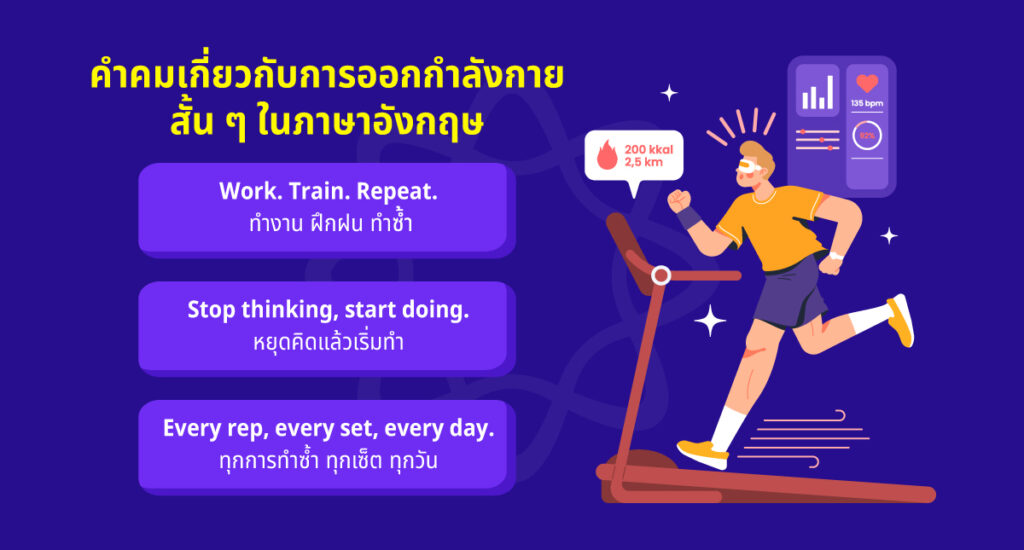
| คําคม ออกกําลังกาย ภาษาอังกฤษ | ภาษาไทย |
| Work. Train. Repeat. | ทำงาน ฝึกฝน ทำซ้ำ |
| Sweat now, shine later. | เสียเหงื่อในตอนนี้ เพื่อรูปร่างที่ดีในวันหน้า |
| Stop thinking, start doing. | หยุดคิดแล้วเริ่มทำ |
| Fuel your body, feed your soul. | เติมพลังให้ร่างกายและจิตวิญญาณ |
| Finishing the day strong with a workout. | ปิดท้ายวันอย่างแข็งแกร่งด้วยการออกกำลังกาย |
| Sunset sweat, all-night strength. | เหงื่อออกยามพระอาทิตย์ตกดินทําให้มีพลังตลอดคืน |
| Excuses don’t burn calories. | ข้อแก้ตัวไม่ได้ช่วยเผาผลาญแคลอรี่ |
| Sweat, sacrifice, and progress. | เหงื่อและความเสียสละจะทําให้เกิดความก้าวหน้า |
| Every rep, every set, every day. | ทุกการทําซํ้า ทุกเซ็ต ทุกวัน |
| Fitness is a journey, not a destination. | การออกกำลังกายเป็นการเดินทาง ไม่ใช่จุดหมายปลายทาง |
| Stronger muscles, stronger mind. | ถ้ากล้ามเนื้อแข็งแรงขึ้น จิตใจก็จะเข้มแข็งขึ้น |
| Each workout brings me closer to my goals. | การออกกำลังกายแต่ละครั้งช่วยให้ฉันเข้าใกล้เป้าหมายมากขึ้น |
| The best part of the day: post-workout reflections. | เรื่องที่ดีที่สุดของวัน: การสังเคราะห์โปรตีนหลังการออกกำลังกาย |
| Work out. Eat well. Be patient. Your body will reward you. | ออกกำลังกาย กินอาหารดี ๆ อดทนและร่างกายจะตอบแทนคุณเอง |
| The real workout starts when you want to stop. | ออกกำลังกายสม่ำเสมอ ดูแลโภชนาการอาหารให้ดีและเพียงอดทนรอคอยสิ่งที่ร่างกายของคุณจะให้รางวัลกับตัวคุณ |
| Today I will love myself enough to exercise. | วันนี้ฉันจะรักตัวเองให้มากพอโดยการออกกำลังกาย |
| Don’t wish for a good body, work for it. | อย่าเอาแต่ขอพรให้มีสุขภาพดีแต่จงสร้างมันด้วยตัวเอง |
| You won’t always love the workout, but you will always love the result. | คุณอาจจะไม่ชอบการออกกำลังกาย แต่คุณจะชอบผลลัพธ์ที่ได้เสมอ |
| Success doesn’t start in the gym. It starts in your mind. | ความสำเร็จไม่ได้เริ่มต้นที่ยิม แต่เริ่มต้นที่จิตใจของคุณเอง |
| Sore today, strong tomorrow. | วันนี้อาจจะเจ็บแต่พรุ่งนี้ก็จะเข้มแข็งขึ้น |
| You don’t need to be perfect. But you really need to start exercising. | คุณไม่จำเป็นต้องสมบูรณ์แบบแต่คุณต้องเริ่มออกกำลังกายจริง ๆ แล้ว |
| “The groundwork for all happiness is good health.” — Leigh Hunt | “รากฐานของความสุขทั้งหมดคือสุขภาพที่ดี” — Leigh Hunt |
| “Increased physical activity enhances positive energy.” — Lailah Gifty Akita | “การเพิ่มการออกกำลังกายจะช่วยเพิ่มพลังงานในเชิงบวก” — Lailah Gifty Akita |
| “Exercise is king. Nutrition is queen. Put them together and you’ve got a kingdom”. – Jack LaLanne | “การออกกำลังกายคือราชา โภชนาการคือราชินี เมื่อรวมทั้งสองอย่างนี้เข้าด้วยกัน คุณก็จะมีอาณาจักรของตัวเอง” – Jack LaLanne |
| “Once you are exercising regularly, the hardest thing is to stop it.” – Erin Gray | “เมื่อคุณออกกำลังกายสม่ำเสมอ สิ่งที่ยากที่สุดคือการหยุดมัน” – Ronnie Coleman |
| “Your body is your most priceless possession. Take care of it.” — Jack Lalanne | “ร่างกายของคุณคือทรัพย์สินล้ำค่าที่สุดของคุณ จงดูแลมันให้ดี” — Jack LaLanne |
| “Exercising will make you look better, feel stronger, and fill you with boundless energy. Staying fit will even make you happier.” — Robin S. Sharma | “การออกกำลังกายจะทำให้คุณดูดี รู้สึกแข็งแรงขึ้น และมีพลังอย่างไม่มีขีดจำกัด การรักษาตัวให้อยู่ดีจะทำให้คุณมีความสุขมากขึ้น” — Robin S. Sharma |
>>> Read more:
- ออกกําลังกายภาษาอังกฤษ: รวบรวมคำศัพท์ สำนวน รูปแบบประโยคที่พบบ่อยที่สุด
- คำศัพท์เกี่ยวกับกีฬาภาษาอังกฤษที่คุณอาจจะยังไม่รู้
- 35 คำอวยพรเรียนจบ สั้นๆ มีความหมายดีๆในภาษาอังกฤษ
แคปชั่นเกี่ยวกับยิมและการออกกําลังกายภาษาอังกฤษ

| แคปชั่นยิม ออกกําลังกาย ภาษาอังกฤษ | ภาษาไทย |
| I’ve got 99 problems, but I’m going to the gym to ignore all of them. | ฉันมีปัญหานับร้อย แต่ฉันไม่สนใจเพราะฉันจะไปยิม |
| “Now I’m in the gym with my squats and my sit-ups.” — Nicki Minaj, ‘Go Hard’ | “ตอนนี้ฉันทําท่าสควอชและซิทอัพอยู่ในยิม” — Nicki Minaj, ‘Go Hard’ |
| “I bench press elephants and bowling ball juggle.” — Lupe Fiasco, ‘SLR’ | “ฉันฝึกยกน้ำหนักและโยนลูกโบว์ลิ่ง” — Lupe Fiasco, ‘SLR’ |
| I am in love with the gym. I can’t go a day without it. | ฉันหลงรักยิมมาก ฉันขาดมันไม่ได้เลยสักวัน |
| I’m not a morning person, but mornings go better with the gym. | ฉันไม่ใช่คนชอบตื่นเช้า แต่ตอนเช้า ๆ จะดีกว่าถ้าไปยิม |
| I’m feeling so much better now that I’ve started going to the gym again. | ตอนนี้ฉันรู้สึกดีขึ้นมากหลังจากที่เริ่มไปยิมอีกครั้ง |
| The Gym is my playground. | ยิมคือสนามที่พักผ่อนหย่อนใจเล่นของฉัน |

แคปชั่นเกี่ยวกับการออกกําลังกายตลก ๆ ในภาษาอังกฤษ
| Caption ออกกําลังกาย ภาษาอังกฤษ | ภาษาไทย |
| Sweat is just fat crying. | เหงื่อเป็นเพียงเสียงร้องไห้ของไขมัน |
| The only bad workout is the one that didn’t happen. | การออกกำลังกายที่แย่คือการออกกำลังกายที่ไม่ได้เกิดขึ้น |
| I only work out because I really, really like donuts. | ฉันออกกำลังกายก็แค่เพราะว่าฉันชอบโดนัทมาก ๆ |
| I’m only here so I can eat more later. | ฉันมาที่นี่เพื่อจะกินต่อในภายหลัง |
| I’m torn between cardio and pizza. | ฉันไม่สามารถเลือกระหว่างคาร์ดิโอกับพิซซ่าได้ |
| My doctor recently told me that jogging could add years to my life. I think he was right. I feel ten years older already. | เมื่อไม่นานมานี้ คุณหมอบอกฉันว่าการจ็อกกิ้งจะช่วยให้ฉันมีอายุยืนยาวขึ้น ฉันคิดว่าคุณหมอพูดถูกเพราะฉันรู้สึกว่าตัวเองแก่ลงไปอีกสิบปีแล้ว |
| Life has its ups and downs. We call them squats. | ชีวิตมีขึ้นมีลง เราเรียกมันว่าสควอช |
| Each day is another chance to change your life. | แต่ละวันคืออีกโอกาสที่จะเปลี่ยนแปลงชีวิตของคุณ |
| My favorite exercise at the gym would probably be judging. | การออกกำลังกายที่ฉันชอบที่สุดในยิมคงจะเป็นการตัดสิน |
คำคมสร้างแรงบันดาลใจในการออกกำลังกายในภาษาอังกฤษ
การออกกำลังกายเป็นกระบวนการที่ต้องอาศัยความพากเพียรและความพยายาม มาอ่านแคปชั่นด้านล่างนี้เพื่อกระตุ้นให้เราออกกำลังกายกันนะ

| ประโยคออกกําลังกาย ภาษาอังกฤษ | ภาษาไทย |
| Determination fuels my workouts, progress fuels my motivation. | ความมุ่งมั่นเป็นเชื้อเพลิงในการออกกำลังกายของฉันและความก้าวหน้าเป็นเชื้อเพลิงในแรงจูงใจของฉัน |
| Fall in love with the process, and the results will come. | จงตกหลุมรักกับกระบวนการแล้วผลลัพธ์จะตามมา |
| Don’t stop until you’re proud. | อย่าหยุดจนกว่าคุณจะภาคภูมิใจ |
| Work hard in silence, let your success be the noise. | ทำงานหนักอย่างเงียบ ๆ และปล่อยให้ความสำเร็จของคุณเป็นเสียง |
| Your body can stand almost anything. It’s your mind you have to convince. | ร่างกายของคุณสามารถทนต่อทุกสิ่งได้ แต่คุณต้องใช้จิตใจของคุณเองในการโน้มน้าวใจ |
| Results happen over time, not overnight. Work hard, stay consistent, and be patient. | ผลลัพธ์จะเกิดขึ้นเมื่อเวลาผ่านไป ไม่ใช่ชั่วข้ามคืน จงทำงานหนัก พยายามสม่ำเสมอ และอดทน |
| You don’t have to be great to start, but you have to start to be great. | คุณไม่จำเป็นต้องยิ่งใหญ่เพื่อเริ่มต้น แต่คุณต้องเริ่มต้นเพื่อที่จะยิ่งใหญ่ |
| It’s a slow process, but quitting won’t speed it up. | มันเป็นกระบวนการที่ช้าแต่การเลิกจะไม่ทำให้มันเร็วขึ้น |
| Fitness is not about being better than someone else. It’s about being better than you used to be. | การออกกำลังกายไม่ได้หมายถึงการดีกว่าคนอื่น แต่หมายถึงการดีกว่าที่เคยเป็น |
| The body achieves what the mind believes. | ร่างกายจะบรรลุสิ่งที่จิตใจเชื่อ |
| Good things come to those who sweat. | สิ่งดี ๆ จะเกิดขึ้นกับผู้ที่อดทนรอ |
| Exercise is a celebration of what your body can do, not a punishment for what you ate. | การออกกำลังกายคือการเฉลิมฉลองในสิ่งที่ร่างกายของคุณทำได้ ไม่ใช่การลงโทษเพราะสิ่งที่คุณกิน |
| Exercise not only changes your body, it changes your mind, your attitude, and your mood. | การออกกำลังกายไม่เพียงแต่เปลี่ยนร่างกายของคุณเท่านั้น แต่ยังเปลี่ยนความคิด ทัศนคติ และอารมณ์ของคุณด้วย |
| Be patient and tough; someday this pain will be useful to you. | อดทนและเข้มแข็ง สักวันความเจ็บปวดนี้จะเป็นประโยชน์ต่อคุณ |
| “Success is walking from failure to failure with no loss of enthusiasm”. Winston Churchill, British statesman and Prime Minister of the United Kingdom. | “ความสำเร็จคือการก้าวจากความล้มเหลวหนึ่งไปสู่อีกความล้มเหลวหนึ่งโดยไม่สูญเสียความกระตือรือร้น” – Winston Churchill |
บทความข้างต้นได้รวบรวม แคปชั่นออกกําลังกาย ภาษาอังกฤษ ที่น่าประทับใจเพื่อให้คุณสามารถแชร์กับเพื่อน ๆ ได้แล้ว อย่าลืมติดตาม ELSA Speak เพื่ออัปเดตความรู้ภาษาอังกฤษล่าสุดทุกวันนะ
หลายคนคิดว่าการเรียนภาษาอังกฤษมีไว้สำหรับผู้ที่มีพื้นฐานแล้วเท่านั้น อย่างไรก็ตามมันไม่ใช่เรื่องจริง การเรียนภาษาอังกฤษโดยไม่มีพื้นฐานใด ๆ เป็นไปได้อย่างแน่นอน บทความนี้จะเป็นคำตอบที่ชัดเจนที่สุด ตาม ELSA Speak มาดู เรียนภาษาอังกฤษ ไม่มีพื้นฐานเลย ที่ไหนดี และ 10+ วิธีการเรียนภาษาอังกฤษที่มีประสิทธิภาพสำหรับผู้เริ่มต้นในบทความต่อไปนี้กันเถอะ
วิธีเริ่มเรียนภาษาอังกฤษโดยไม่มีพื้นฐาน
เรียนภาษาอังกฤษ ไม่มี พื้นฐานเลย เริ่ม ยัง ไง? สามารถมาดูคำแนะนำต่อไปนี้
ทำความเข้าใจจุดอ่อนและจุดแข็งของตัวเอง
ก่อนที่จะเริ่มเรียนภาษาอังกฤษ เราต้องพิจารณาความสามารถและทักษะในปัจจุบันของตัวเองก่อนจึงจะสามารถพัฒนาได้อย่างมีประสิทธิภาพ ซึ่งรวมถึงการทำความเข้าใจจุดแข็งและจุดอ่อนของตัวเอง รวมถึงการวัดความสามารถผ่านเครื่องมือการประเมิน เช่น การทดสอบออนไลน์
มีแบบทดสอบฟรีมากมายจากแอปเรียนภาษาอังกฤษออนไลน์ เช่น ELSA Speak เพื่อช่วยคุณประเมินระดับภาษาอังกฤษของคุณ แบบทดสอบเหล่านี้จะแสดงให้คุณเห็นว่าควรเริ่มต้นอย่างไร ซึ่งเป็นวิธีที่ดีในการเรียนภาษาอังกฤษโดยไม่มีความรู้พื้นฐานใดๆ
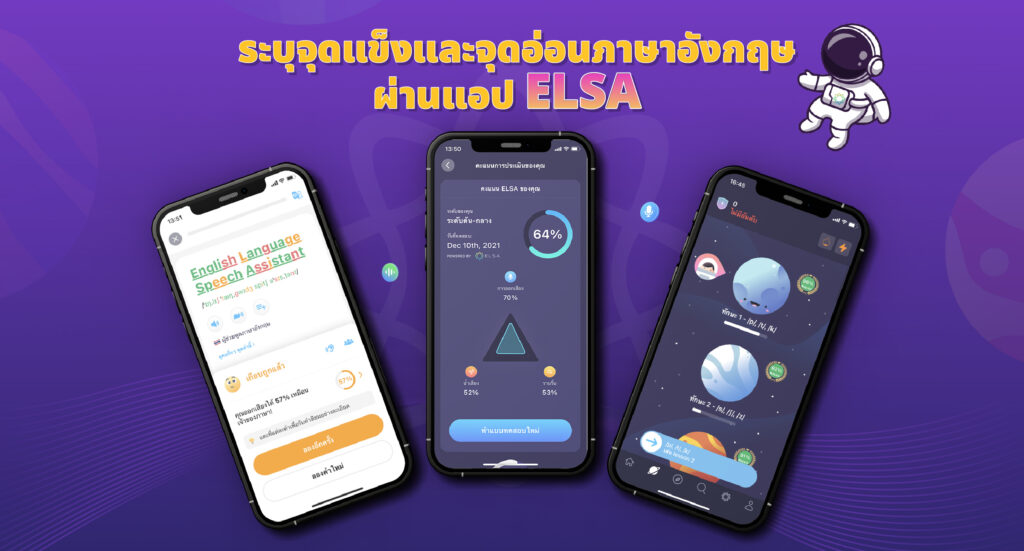
ตั้งเป้าหมายที่ชัดเจน
ขั้นตอนต่อไปในการเรียนภาษาอังกฤษโดยไม่มีพื้นฐานคือการกำหนดเป้าหมายที่ชัดเจน เช่น คุณต้องการที่จะพูดภาษาอังกฤษได้ดีขึ้นภายใน 6 เดือน เขียนภาษาอังกฤษได้ดีขึ้น สนทนากับเพื่อนต่างชาติมากขึ้น เป้าหมายเหล่านี้จะกลายเป็นแรงบันดานใจที่กระตุ้นให้คุณตั้งใจเรียนแม้ว่าคุณจะไม่มีพื้นฐานภาษาอังกฤษก็ตาม

หาวิธีการเรียนที่เหมาะสม
หลายๆ คนอยากเรียนภาษาอังกฤษแต่ไม่มีพื้นฐาน หากต้องการเรียนอย่างมีประสิทธิภาพ ให้เลือกวิธีการเรียนที่เหมาะสม การลงทะเบียนเรียนที่โรงเรียนกับอาจารย์ผู้สอนที่มีประสบการณ์และวิธีการสอนที่หลากหลายจะทำให้การเรียนภาษาดีขึ้นและน่าสนใจยิ่งขึ้น สามารถทำตามวิธีการต่อไปนี้:
- คอร์สเรียนออนไลน์: เหมาะสำหรับผู้ที่อยากเรียนคนเดียว ค่อยๆ เข้าใจ และต้องเน้นสมาธิในการเรียน
- คอร์สเรียนที่จะเรียนร่วมกับผู้อื่น: เหมาะสำหรับผู้ที่ต้องการฝึกฝนกับเพื่อน อยากเพิ่มความมั่นใจ แลกเปลี่ยนความคิดเห็น
- เรียนตัวต่อตัว: เหมาะสำหรับผู้ที่ต้องการฝึกภาษาอังกฤษแบบเข้มข้นกับครูเจ้าของภาษา มุ่งเน้นการพัฒนาทักษะที่ต้องการอย่างเต็มที่
10+ วิธีในการเรียนภาษาอังกฤษโดยไม่มีพื้นฐานใดๆ แต่ก็สามารถเก่งได้
ใครๆ ก็สามารถเริ่มต้นด้วย 9 วิธีในการเรียนภาษาอังกฤษโดยไม่มีพื้นฐานใดๆ ต่อไปนี้:
ทบทวนภาษาอังกฤษพื้นฐาน
เมื่อเริ่มต้นเรียนภาษาอังกฤษตั้งแต่ 0 สิ่งที่สำคัญที่สุดคือการสร้างรากฐานที่มั่นคง คุณควรเน้นการเรียนรู้การออกเสียง ไวยากรณ์พื้นฐานและคำศัพท์ที่ถูกต้อง ความรู้นี้จะเป็นพื้นฐานสำหรับคุณในการพัฒนาทักษะการฟัง พูด อ่าน และเขียนในภายหลัง คุณสามารถเรียนรู้ผ่านหนังสือ วีดีโอ หรือแอปพลิเคชันเรียนภาษาอังกฤษออนไลน์ได้

เรียนรู้จากสิ่งรอบตัว
การเรียนรู้ภาษาจากสิ่งรอบตัวเป็นวิธีที่มีประสิทธิภาพ คุณสามารถใช้หนังสือ ภาพยนตร์ เพลง หรือสื่อสารกับเจ้าของภาษาเพื่อพัฒนาคำศัพท์และทักษะการฟังและการพูด การใช้ภาษาในชีวิตประจำวันเป็นประจำจะช่วยให้คุณพัฒนาได้อย่างรวดเร็ว
เล่าเรื่องราวเกี่ยวกับชีวิตประจำวัน
อีกวิธีหนึ่งในการเรียนภาษาอังกฤษโดยไม่มีความรู้พื้นฐานคือการจดบันทึกประจำวัน หลายๆ คนชอบบันทึกเรื่องราวในแต่ละวัน ดังนั้นลองเปลี่ยนมุมมองของคุณดู ในวันแรกคุณสามารถลองเขียนเรื่องราวของคุณเป็นประโยคภาษาอังกฤษ 1 ประโยคก่อนที่จะเพิ่มประโยคเพิ่มเติม วิธีนี้จะช่วยฝึกความสามารถในการคิดของคุณ เล่าเรื่องเป็นภาษาอังกฤษผ่านทักษะการเขียนพร้อมกับการเพิ่มจำนวนคำศัพท์ ซึ่งจะช่วยให้คุณใช้ภาษาอังกฤษได้คล่องมากขึ้น
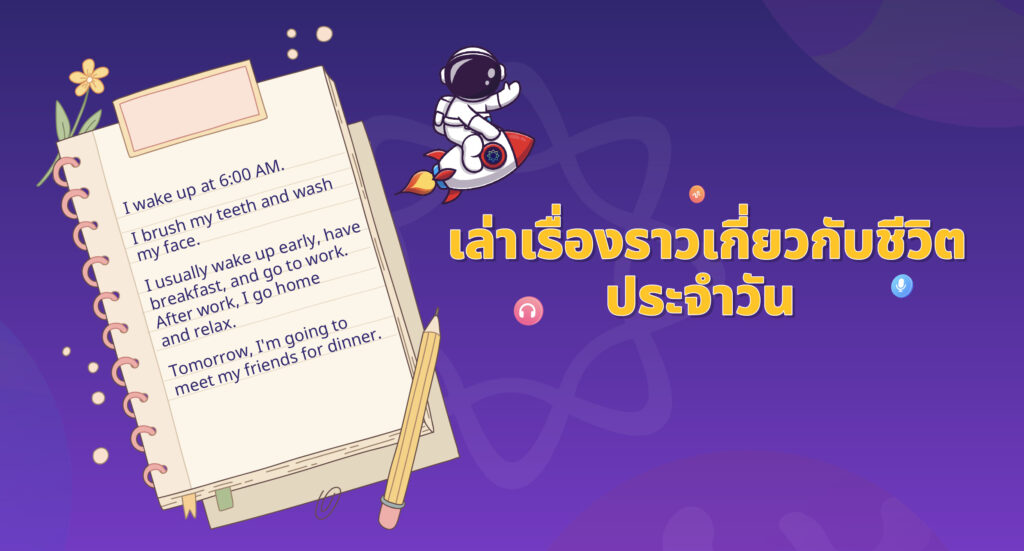
เลือกรับเนื้อหาเป็นภาษาอังกฤษ
นอกจากนี้เรายังสามารถเรียนภาษาอังกฤษได้โดยไม่ต้องมีความรู้พื้นฐานโดยเลือกรับรู้เนื้อหาภาษาอังกฤษต่างๆ เช่น
- ทักษะการฟัง: เลือกเพลง รายการต่างประเทศ หนัง บทสนทนาภาษาอังกฤษ ข่าวภาษาอังกฤษ แม้จะพูดภาษาอังกฤษเร็วและมีคำศัพท์ที่ยาก แต่ก็จะช่วยให้เราคุ้นเคยกับสำเนียงอังกฤษมากขึ้น
- ทักษะการอ่าน: เลือกหนังสือ นิตยสาร หรือบทความภาษาอังกฤษที่เหมาะกับระดับของคุณ ยิ่งอ่านจะยิ่งเข้าใจโครงสร้างของประโยคภาษาอังกฤษมากขึ้น
เลือกเรียนภาษาอังกฤษออนไลน์
ในปัจจุบัน เทคโนโลยีสามารถเข้าถึงผู้คนได้รวดเร็วยิ่งขึ้น มีช่องทางเกี่ยวกับสื่อการสอนภาษาอังกฤษออนไลน์มากมาย พร้อมให้เราเรียนภาษาอังกฤษแบบไม่มีพื้นฐานทุกเวลา เช่น
- เว็บไซต์การศึกษา
- บทความเรียนภาษาอังกฤษ
- แอปพลิเคชันการสอนภาษาอังกฤษช่วยฝึกทักษะการอ่าน การฟัง การพูด และการเขียน เช่น Duolingo, ELSA Speak, Rosetta Stone หรือ Memrise
ช่องทางเหล่านี้มีอยู่ทุกที่และบางช่องก็ฟรี สามารถเข้ามาเรียนได้ฟรีทุกเวลาที่สะดวก ซึ่งถือว่าสามารถฝึกทักษะทั้ง 4 ได้ตามความต้องการ

เข้าร่วมกิจกรรมนอกหลักสูตรภาษาอังกฤษ
นอกจากช่องทางออนไลน์ข้างต้นแล้วเรายังสามารถเรียนรู้แบบออฟไลน์ได้อีกด้วย โดยเข้าร่วมกิจกรรมส่งเสริมภาษาอังกฤษ เช่น
- กิจกรรม ภาษาอังกฤษที่โรงเรียน
- พูดคุยกับชาวต่างชาติที่สถานที่ท่องเที่ยวต่างๆ
- อาสาเป็นมัคคุเทศก์ให้กับนักท่องเที่ยวชาวต่างชาติ
- ลงทะเบียนเป็นอาสาสมัครในต่างประเทศ
ด้วยกิจกรรมที่หลากหลายเหล่านี้ ขั้นตอนแรกคือการช่วยให้คุณตัดสินใจออกจากกรอบของตัวเอง กล้าที่จะท้าทายตัวเอง พาตัวเองไปยังสถานที่ใหม่ๆ การพบปะผู้คนจำนวนมากที่ใช้ภาษาอังกฤษเป็นวิธีการสื่อสารหลักจะช่วยเพิ่มความมั่นใจและพัฒนาทักษะภาษาอังกฤษอื่นๆ

ฝึกฝนภาษาอังกฤษอย่างสม่ำเสมอ
บางคนบอกว่าอยากเก่งภาษาอังกฤษแต่ฉันไม่มีพื้นฐาน ฉันคิดว่าคงทำไม่ได้ ซึ่งมันจะบั่นทอนกำลังใจตัวเอง สิ่งนี้จะทำให้ความพยายามในการเรียนของคุณหมดไป ทำให้คุณผัดวันประกันพรุ่ง หยุดแล้วหยุดอีกหรือมันจะทำให้ความกระตือรือร้นของคุณหายไป ดังนั้นการให้กำลังใจตัวเองจึงเป็นสิ่งสำคัญ มั่นใจว่าเราสามารถเรียนภาษาอังกฤษได้โดยไม่ต้องมีความรู้พื้นฐานใดๆ
คุณสามารถฝึกให้เก่งได้เมื่อคุณมีกำลังใจและมีความมั่นใจ สิ่งที่ขาดไม่ได้อีกประการหนึ่งคือความพยายามและความมุ่งมั่นในการเรียนรู้อย่างสม่ำเสมอ เพราะภาษาอังกฤษไม่สามารถคล่องได้ในการเรียนเพียงครั้งเดียว แต่เป็นนิสัยที่มีระเบียบวินัย ทำซ้ำๆ สม่ำเสมอ จนกลายเป็นนิสัย จึงจะสามารถสื่อสารภาษาอังกฤษได้อย่างเป็นธรรมชาติ
อ่านข่าวภาษาอังกฤษ
การอ่านข่าวภาษาอังกฤษเป็นวิธีหนึ่งที่มีประสิทธิภาพที่สุดในการพัฒนาระดับภาษาอังกฤษ การได้ใช้ภาษาในบริบทในชีวิตจริงเป็นประจำจะช่วยให้คุณคุ้นเคยกับสำนวนที่เป็นธรรมชาติและขยายคำศัพท์ได้อย่างรวดเร็วและแม่นยำ ในขณะเดียวกัน การอ่านข่าวยังช่วยให้คุณไม่พลาดข่าวสารเกี่ยวกับเหตุการณ์ปัจจุบันในโลก ฝึกความสามารถในการคิดอย่างมีวิจารณญาณ และปรับปรุงความเข้าใจในวัฒนธรรมของประเทศอื่น ๆ

ดูหนังและซีรีย์ต่างประเทศ
การดูหนังเป็นวิธีที่ดีเยี่ยมในการฝึกทักษะการฟังเพื่อความเข้าใจ ด้วยการฟังบทสนทนาในหนัง คุณจะค่อยๆ คุ้นเคยกับความเร็วในการพูดของเจ้าของภาษา และปรับปรุงความสามารถในการติดตามการสนทนาจริง ขณะเดียวกันการดูหนังพร้อมคำบรรยายภาษาอังกฤษจะช่วยให้คุณเปรียบเทียบเสียงและภาพได้ จึงทำให้จำคำศัพท์และโครงสร้างประโยคได้อย่างมีประสิทธิภาพ

ฟังพอดแคสต์ภาษาอังกฤษ
การฟังพอดแคสต์ภาษาอังกฤษเป็นวิธีที่ยืดหยุ่นและสะดวกอย่างยิ่งในการเรียนภาษาอังกฤษ คุณสามารถฟังพอดแคสต์ได้ทุกที่ทุกเวลา เช่น ตอนไปทำงาน ออกกำลังกาย หรือทำอาหาร การได้ฟังภาษาอังกฤษผ่านพอดแคสต์เป็นประจำจะช่วยให้คุณคุ้นเคยกับเสียงที่เป็นธรรมชาติของเจ้าของภาษา ช่วยเพิ่มความเข้าใจในการฟังของคุณได้อย่างรวดเร็ว

เรียนคำศัพท์จากสิ่งแวดล้อมรอบตัว
การเรียนรู้คำศัพท์จากสิ่งรอบตัวช่วยให้คุณคุ้นเคยกับวิธีใช้คำศัพท์ในบริบทในชีวิตจริง ในการสนทนาหรือในบทความในชีวิตประจำวัน คุณจะจดจำและประยุกต์ใช้คำนั้นในการสื่อสารจริงได้อย่างง่ายดาย สิ่งนี้ช่วยให้คุณพัฒนาความสามารถในการใช้ภาษาอังกฤษอย่างเป็นธรรมชาติและยืดหยุ่นมากขึ้น
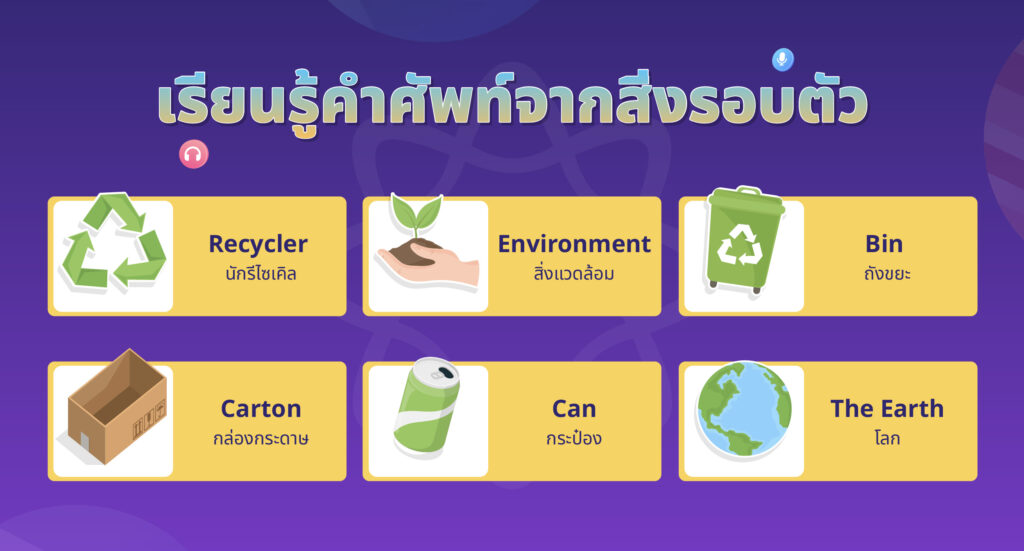
เล่นเกม
การเล่นเกมภาษาอังกฤษเป็นวิธีการเรียนรู้ที่มีประสิทธิภาพและน่าสนใจ ช่วยให้ผู้เรียนพัฒนาทักษะทางภาษาอย่างครอบคลุม เช่น การฟัง การพูด การอ่าน และการเขียน ผ่านเกม คุณไม่เพียงแต่เรียนรู้คำศัพท์ใหม่ ๆ เท่านั้น แต่ยังได้ฝึกฝนการสื่อสาร การคิดเชิงตรรกะ และทักษะการแก้ปัญหา ในขณะเดียวกันก็สร้างแรงจูงใจในการเรียนรู้ในระยะยาว
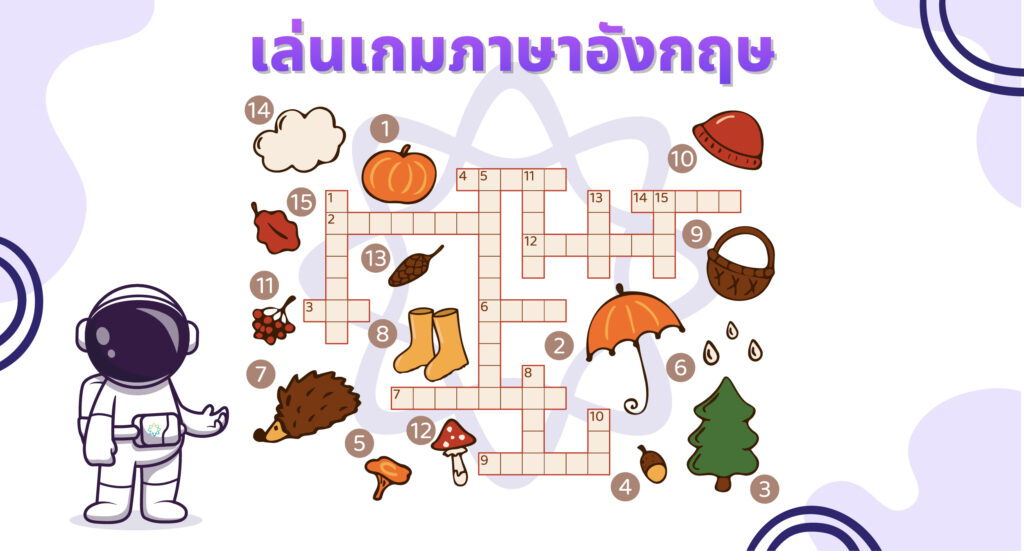
อ่านหนังสือภาษาอังกฤษ
การอ่านหนังสือภาษาอังกฤษเป็นวิธีการเรียนรู้ที่มีประสิทธิภาพและน่าสนใจ ช่วยให้ผู้เรียนพัฒนาทักษะทางภาษาอย่างครอบคลุม เช่น การฟัง การพูด การอ่าน และการเขียน คุณไม่เพียงแต่เรียนรู้คำศัพท์ใหม่ๆ ผ่านหนังสือเท่านั้น แต่ยังได้ฝึกฝนทักษะการสื่อสาร การคิดเชิงตรรกะ และการแก้ปัญหา ในขณะเดียวกันก็สร้างแรงจูงใจในการเรียนรู้ระยะยาวอีกด้วย
พูดคุยกับชาวต่างชาติ
สำหรับผู้ที่ต้องการเรียนภาษาอังกฤษโดยไม่มีพื้นฐานใดๆ การมีเพื่อนต่างชาติจะช่วยให้คุณปรับตัวกับพื้นฐานได้อย่างเป็นธรรมชาติ เพราะการพูดจะทำให้เราได้ฝึกฝนทักษะการพูดและคำสแลงที่เราได้เรียนรู้มา การออกเสียงภาษาอังกฤษที่ถูกต้องช่วยลดความเขินอายในการสนทนา เพิ่มความมั่นใจในการใช้ภาษาอังกฤษมากยิ่งขึ้น เพราะบางครั้งภาษาอังกฤษไม่ต้องการความถูกต้องทางไวยากรณ์ แต่ต้องการการสื่อสารที่สมบูรณ์มากกว่า

สมัครเรียนในศูนย์ภาษาอังกฤษ
วิธีสุดท้ายในการเรียนภาษาอังกฤษโดยไม่ต้องมีความรู้พื้นฐานคือการลงทะเบียนที่ศูนย์สอนภาษา เพราะบางคนอาจจะไม่รู้ว่าจะเริ่มฝึกภาษาอังกฤษยังไงดี การมีศูนย์สอนภาษาเข้ามาคอยแนะนำอาจจะดีกว่า เพราะศูนย์สอนภาษาเหล่านี้จะมีอาจารย์ที่มีประสบการณ์มากมายและมีความเชี่ยวชาญรวมถึงเทคนิคการสอนที่แตกต่างกันพร้อมทั้งสื่อการสอนทำให้เราสามารถฝึกฝนได้ไม่จำกัด
โดยเฉพาะผู้ที่อยากเก่งภาษาอังกฤษแต่ยังไม่มีพื้นฐานควรเลือกเรียนหลักสูตรภาษาอังกฤษพื้นฐานก่อนเพื่อพัฒนาความรู้ภาษาอังกฤษพื้นฐาน ก่อนที่จะนำไปใช้พัฒนาและศึกษารายวิชาอื่นที่ยากกว่าหรือมีการประยุกต์ใช้งานได้กว้างขึ้น โดยเฉพาะเลือกเรียนที่ ELSA Speak ซึ่งมีหลักสูตรหลากหลาย เช่น
- หลักสูตรพื้นฐาน
- หลักสูตรแบบตัวต่อตัว
- หลักสูตรเรียนออนไลน์
- หลักสูตรฝึกทักษะเฉพาะด้าน
- หลักสูตรเตรียมสอบ
สามารถเห็นได้ว่าที่ ELSA Speak มีหลักสูตรที่ตอบโจทย์ความต้องการของทุกคน หลังจากจบหลักสูตรหนึ่งแล้ว คุณสามารถเลือกเรียนหลักสูตรอื่นเพื่อเพิ่มพูนความรู้และทักษะของตัวเองได้ เชื่อเถอะว่าทุกคนสามารถเก่งภาษาอังกฤษได้
>>> Read more:
- โรงเรียนสอนภาษาอังกฤษที่มีประสิทธิภาพ 10 อันดับแรกในปี 2568
- เรียนภาษาอังกฤษที่ไหนดี? Top 5 สถานที่เรียนภาษาอังกฤษที่ดี
คำถามที่พบบ่อย
การเรียนภาษาอังกฤษโดยไม่มีความรู้พื้นฐานอาจทำให้หลายคนสูญเสียความมั่นใจ คุณสามารถเก่งภาษาอังกฤษได้จริงหรือไม่? ELSA Speak ได้รวบรวมคำถามและคำตอบไว้ในนี้แล้ว
ฉันไม่มีพื้นฐานภาษาอังกฤษ ฉันสามารถพูดคุยกับเพื่อนชาวต่างชาติได้หรือไม่?
ภาษาอังกฤษถือเป็นภาษาสากลที่ใช้ในการสื่อสารทั่วโลกแม้ว่าเราจะไม่มีภาษาอังกฤษขั้นพื้นฐานก็ตาม การเรียนภาษาอังกฤษไม่จำเป็นต้องเน้นเรื่องไวยากรณ์มากเกินไปตั้งแต่เริ่มต้น ที่สำคัญคือต้องสามารถสื่อสารและถ่ายทอดความคิดของตัวเองได้ การเริ่มต้นด้วยประโยคง่ายๆ คำศัพท์พื้นฐาน และการฝึกฝนอย่างสม่ำเสมอจะช่วยให้คุณมีความมั่นใจในการสื่อสารมากขึ้น เพื่อนชาวต่างชาติจะช่วยคุณพัฒนาความสามารถในการพูดและแก้ไขข้อผิดพลาด สื่อสารเชิงรุกเพื่อทำความคุ้นเคยกับภาษาอังกฤษในสถานการณ์จริง โปรดจำไว้ว่าความเพียรเป็นปัจจัยสำคัญสู่ความสำเร็จ

ไม่มีภาษาอังกฤษพื้นฐานควรไปเรียนที่ศูนย์ภาษาต่างประเทศหรือไม่?
ศูนย์ภาษาเป็นตัวเลือกที่ดีหากคุณไม่มีพื้นฐานภาษาอังกฤษ ด้วยทีมคณาจารย์ที่มีประสบการณ์ ศูนย์ภาษาจะจัดเตรียมสภาพแวดล้อมการเรียนรู้แบบมืออาชีพและการสนับสนุนที่ทุ่มเทให้กับนักเรียนตั้งแต่เริ่มต้น หลักสูตรมีความหลากหลายและยืดหยุ่น ตั้งแต่ชั้นเรียนกลุ่มแบบดั้งเดิมไปจนถึงบทเรียนออนไลน์แบบตัวต่อตัว ช่วยให้นักเรียนเลือกรูปแบบการเรียนรู้ในเชิงรุกที่เหมาะกับความสามารถและเวลาของตัวเองได้
นอกจากนี้ การมีปฏิสัมพันธ์กับนักเรียนคนอื่นๆ ยังสร้างโอกาสในการฝึกฝนการสื่อสารภาษาอังกฤษอย่างมีประสิทธิภาพ ดังนั้นการเรียนภาษาอังกฤษแบบไม่มีพื้นฐานจึงถือว่าเหมาะมากสำหรับการเรียนในศูนย์สอนภาษา

ฉันควรจัดการเวลาในการเรียนภาษาอังกฤษด้วยตนเองอย่างไร?
ภาษาอังกฤษจะต้องได้รับการฝึกฝนอย่างมีวินัยและสม่ำเสมอ โดยเฉพาะผู้ที่อยากเรียนภาษาอังกฤษด้วยตนเองโดยไม่มีพื้นฐานต้องจัดการเวลาให้เหมาะสมตามสถานการณ์ของแต่ละคน โดยปกติคุณควรทบทวนภาษาอังกฤษอย่างน้อยวันละ 15 – 30 นาที ก่อนที่จะค่อยๆ เพิ่มเวลา เลือกกรอบเวลาเรียนที่เหมาะกับตารางเวลาของคุณ คุณสามารถตั้งเป้าหมายที่จะเรียนเป็นจำนวนชั่วโมงต่อสัปดาห์แล้วแบ่งเวลาเรียนในแต่ละวัน
เวลาที่เหมาะในการเรียนคือเมื่อคุณรู้สึกตื่นตัวและมีสมาธิมากที่สุด เลือกพื้นที่ที่เงียบสงบและสะดวกสบายในการเรียน เช่น คุณสามารถเรียนหนังสือในห้องสมุด ร้านกาแฟ หรือที่บ้านก็ได้ ที่สำคัญคือต้องเรียนอย่างสม่ำเสมอ ทำให้การเรียนภาษาอังกฤษกลายเป็นนิสัยที่ขาดไม่ได้ในชีวิตประจำวันของคุณ
คำแนะนำการเรียนภาษาอังกฤษด้วยตนเองอย่างมีประสิทธิภาพ
เรียนภาษาอังกฤษแต่ไม่มีความรู้พื้นฐาน? จะเริ่มต้นอย่างไร? การเรียนภาษาอังกฤษไม่ยากอย่างที่คิด สิ่งสำคัญคือคุณมีวิธีการเรียนรู้ที่ถูกต้องและฝึกฝนอย่างต่อเนื่อง เริ่มต้นด้วยการเรียนรู้พื้นฐานและฝึกฝนทักษะการสื่อสารในชีวิตประจำวัน ด้วยการสนับสนุนสื่อการเรียนและชุมชนการเรียนรู้ภาษาอังกฤษก็คุณจะก้าวหน้าอย่างรวดเร็ว
ด้วย เรียนภาษาอังกฤษ ไม่มีพื้นฐานเลย ที่ไหนดี และ 10+ วิธีการเรียนภาษาอังกฤษที่มีประสิทธิภาพข้างต้น การเรียนภาษาอังกฤษโดยไม่มีพื้นฐานใดๆ จะกลายเป็นเรื่องง่ายกว่าที่เคย เริ่มต้นวันนี้เลยด้วยการเลือกวิธีการที่เหมาะสมและมุ่งมั่นในการนำไปปฏิบัติ อย่าลืมแบ่งปันอุปสรรคในการเรียนภาษาอังกฤษและความสำเร็จของคุณให้กับชุมชนการเรียนภาษาอังกฤษเพื่อก้าวหน้าไปด้วยกันกับ ELSA Speak ขอให้คุณประสบความสำเร็จในเส้นทางการพิชิตภาษาอังกฤษนะ
หัวข้อเกี่ยวกับ วิชาต่าง ๆ ในภาษาอังกฤษ เป็นหนึ่งในหัวข้อยอดนิยมในการสื่อสารภาษาอังกฤษโดยเฉพาะกับนักเรียน นักศึกษา ในบทความนี้ ELSA Speak จะรวบรวม คำศัพท์วิชาต่างๆในภาษาอังกฤษ ทั้งหมดและโครงสร้างประโยคที่มีหัวข้อเดียวกันให้กับคุณติดตามกันเลย
Subject มีวิชาอะไรบ้าง
ชื่อวิชาในภาษาอังกฤษคือ “subjects” ตามพจนานุกรมของเคมบริดจ์ คำว่า “subject” หมายความว่า “เรื่องที่กำลังหารือ พิจารณา หรือศึกษาตามขอบเขตของการสนทนา” หรือ “สาขาวิชาความรู้ที่ได้ศึกษาในโรงเรียน วิทยาลัย หรือมหาวิทยาลัย”
ชื่อวิชาภาษาอังกฤษ
ด้านล่างนี้คือ วิชาต่างๆภาษาอังกฤษ พร้อมคําอ่าน วิชาแบ่งออกเป็นสี่กลุ่ม สังคมศาสตร์ วิทยาศาสตร์ กีฬา และศิลปะ

วิทยาศาสตร์ธรรมชาติ
| วิชาในภาษาอังกฤษ | ถอดเสียง | แปล |
| Geology | /dʒiˈɒl.ə.dʒi/ | ธรณีวิทยา |
| Medicine | /ˈmed.ɪ.sən/ | แพทย์ศาสตร์ |
| Science | /ˈsaɪ.əns/ | วิทยาศาสตร์ |
| Physics | /ˈfɪz.ɪks/ | ฟิสิกส์ |
| Geometry | /dʒiˈɒm.ə.tri/ | เรขาคณิต |
| Engineering | /ˌen.dʒɪˈnɪə.rɪŋ/ | วิศวกรรม |
| Algebra | /ˈæl.dʒə.brə/ | พีชคณิต |
| Maths | /mæθs/ | คณิตศาสตร์ |
| Information technology | /ˌɪn.fəˈmeɪ.ʃən tekˈnɒl.ə.dʒi/ | เทคโนโลยีสารสนเทศ |
| Chemistry | /ˈkem.ɪ.stri/ | เคมี |
| Biology | /baɪˈɒl.ə.dʒi/ | ชีววิทยา |
| Astronomy | /əˈstrɒn.ə.mi/ | ดาราศาสตร์ |
สังคมศาสตร์

| School subject คําศัพท์ | ถอดเสียง | แปล |
| Girl guide | /ˌɡɝːl ˈɡaɪd/ | ยุวกาชาด/ เนตรนารี |
| Religious education | /rɪˈlɪdʒ.əs/ /ˌedʒ.əˈkeɪ.ʃən/ | ศาสนา |
| Thai language | /taɪ/ /ˈlæŋ.ɡwɪdʒ/ | ภาษาไทย |
| English | /ˈɪŋ.ɡlɪʃ/ | ภาษาอังกฤษ |
| Guidance | /ˈɡaɪ.dəns/ | แนะแนว |
| Citizenship | /ˈsɪt̬.ə.zən.ʃɪp/ | หน้าที่พลเมือง |
| Home economics | /ˌhoʊm iː.kəˈnɑː.mɪks/ | การงานอาชีพ |
| Boy scout | /bɔɪ/ /skaʊt/ | ลูกเสือ |
| Botany | /ˈbɑː.t̬ən.i/ | เกษตร |
| Literature | /ˈlɪt̬.ɚ.ə.tʃɚ/ | วรรณกรรม |
| Social studies | /ˈsəʊ.ʃəl ˈstʌd·iz/ | สังคมศึกษา |
| Health and hygiene | /helθ/ /ən/ /ˈhaɪ.dʒiːn/ | สุขศึกษา |
| Woodwork | /ˈwʊd.wɝːk/ | งานไม้ |
| History | /ˈhɪs.tər.i/ | ประวัติศาสตร์ |
| Psychology | /saɪˈkɒl.ə.dʒi/ | จิตวิทยา |
| Politics | /ˈpɒl.ə.tɪks/ | รัฐศาสตร์ |
| Media studies | /ˈmiː.di.ə ˈstʌd·iz/ | สื่อสารมวลชน |
| Economics | /ˌiː.kəˈnɒm.ɪks/ | เศรษฐศาสตร์ |
| Cultural studies | /ˈkʌl.tʃər.əl ˈstʌd·iz/ | วัฒนธรรมศึกษา |
| Archaeology | /ˌɑː.kiˈɒl.ə.dʒi/ | โบราณคดี |
| Anthropology | /ˌæn.θrəˈpɒl.ə.dʒi/ | มนุษยวิทยา |
กีฬา
| วิชา ภาษาอังกฤษ | ถอดเสียง | แปล |
| Physical education | /ˈfɪz.ɪ.kəl ˌedʒ.ʊˈkeɪ.ʃən/ | พละศึกษา |
| PE | /ˌpiːˈiː/ | พละศึกษา |
| Athletics | /æθˈlet.ɪks/ | การกีฬา |
| Gymnastics | /dʒɪmˈnæs.tɪks/ | ยิมนาสติก |
| Judo | /ˈdʒuː.dəʊ/ | ยูโด |
| Karate | /kəˈrɑː.ti/ | คาราเต้ |
| Table tennis | /ˈteɪ.bəl ˌten.ɪs/ | ปิงปอง |
| Badminton | /ˈbæd.mɪn.tən/ | แบดมินตัน |
| Baseball | /ˈbeɪs.bɔːl/ | กีฬาเบสบอล |
| Basketball | /ˈbɑː.skɪt.bɔːl/ | บาสเกตบอล |
| Football soccer | /ˈfʊt.bɔːl//ˈsɒk.ər/ | ฟุตบอล |
| Swimming | /swɪm.ɪŋ/ | ว่ายน้ำ |
| Running | /ˈrʌn.ɪŋ/ | วิ่ง |
| Tennis | /ˈten.ɪs/ | เทนนิส |
| Aerobics | /eəˈrəʊ.bɪks/ | แอโรบิค |
ศิลปะ
| วิชา ภาษาอังกฤษ | ถอดเสียง | แปล |
| Drama | /ˈdræm.ə/ | การแสดง |
| Art | /ɑːt/ | ศิลปะ |
| Fine art | /ˌfaɪn ˈɑːt/ | วิจิตรศิลป์ |
| Music | /ˈmjuː.zɪk/ | ดนตรี |
| Classics | /ˈklæs·ɪks/ | วรรณกรรม |
| Dance | /dɑːns/ | นาฎศิลป |
| Painting | /ˈpeɪn.tɪŋ/ | จิตรกรรม |
| Sculpture | /ˈskʌlp.tʃər/ | ปั้นรูป |
| Architecture | /ˈɑː.kɪ.tek.tʃər/ | สถาปัตยกรรม |
| Design | /dɪˈzaɪn/ | ออกแบบ |
วิชาอื่นๆ
| วิชา ภาษาอังกฤษ | ถอดเสียง | แปล |
| Economics | /,i kə’nɔmiks/ | เศรษฐศาสตร์ |
| Architecture | /’ɑ kitektʃə/ | สถาปัตยกรรม |
| Business studies | /’bizinis /’stʌdis/ | ธุรกิจศึกษา |
| Computer science | /kəm’pju tə ‘saiəns/ | วิทยาศาสตร์คอมพิวเตอร์ |
| Accountancy | /ə’kauntənsi/ | การบัญชี |
| Politics | /’pɔlitiks/ | รัฐศาสตร์ |
| Accountancy | /ə’kauntənsi/ | การบัญชี |
| Microeconomics | /ˌmaɪkrəʊiːkəˈnɒmɪks/ | เศรษฐศาสตร์จุลภาค |
| Macroeconomics | /ˌmækrəʊiːkəˈnɒmɪks/ | เศรษฐศาสตร์มหภาค |
| Development economics | /Di’velәpmәnt, i kə’nɔmiks/ | เศรษฐศาสตร์การพัฒนา |
| Econometrics | /i¸kɔnə´metrik/ | เศรษฐมิติ |
| Public Economics | /’pʌblik , i kə’nɔmiks/ | เศรษฐศาสตร์สาธารณะ |
| Calculus | /’kælkjuləs/ | คณิตศาสตร์ขั้นสูง |
| Market economy | /ˈmɑːkɪt iˈkɒnəmi/ | เศรษฐกิจการตลาด |
| E Commerce | /iː ˈkɒmɜːs/ | พาณิชย์อิเล็กทรอนิกส์ |
| Public Economics | /ˈpʌblɪk ˌiːkəˈnɒmɪks/ | เศรษฐศาสตร์สาธารณะ |
| Probability | /ˌprɒbəˈbɪlɪti/ | คณิตศาสตร์ความน่าจะเป็น |
| Supply chain management | /səˈplaɪ ʧeɪn ˈmænɪʤmənt/ | การจัดการโซ่อุปทาน |
| Research Marketing | /rɪˈsɜːʧ ˈmɑːkɪtɪŋ/ | การวิจัยทางการตลาด |
| Basic Marketing | /ˈbeɪsɪk ˈmɑːkɪtɪŋ/ | การตลาด |
| International business | /ˌɪntəˈnæʃənl ˈbɪznɪs/ | ธุรกิจระหว่างประเทศ |
| Logics | /ˈlɒʤɪks/ | ตรรกศาสตร์ |
| Foreign Investment | /ˈfɒrɪn ɪnˈvɛstmənt/ | กองทุนรวมที่ลงทุนในต่างประเทศ |

โครงสร้างประโยคทั่วไปเกี่ยวกับชื่อวิชาในภาษาอังกฤษ
การทำความเข้าใจโครงสร้างทั่วไปเกี่ยวกับวิชาภาษาอังกฤษจะช่วยให้คุณสื่อสาร ถาม และตอบคำถามเกี่ยวกับตารางเรียนของคุณกับผู้อื่นได้อย่างง่ายดาย ด้านล่างนี้คือโครงสร้างไวยากรณ์ที่ใช้กันทั่วไปในหัวข้อนี้
โครงสร้าง 1
โครงสร้าง: S + has/ have + [ชื่อวิชา] + (today/in your school).
- ความหมาย: โครงสร้างนี้จะตอบคำถามว่า วันนี้คุณเรียนวิชาอะไร/คุณเรียนวิชาอะไรในโรงเรียน,…
- ตัวอย่าง: What subjects did you study today? ( วันนี้คุณเรียนวิชาอะไรบ้าง?)
→ Today I study literature, physics and physical education. (วันนี้ฉันเรียนวรรณคดี ฟิสิกส์ และพละศึกษา)
โครงสร้าง 2
โครงสร้าง: คำกริยาช่วย + S + have + [ชื่อวิชา] + (yesterday/today/tomorrow)?
- ความหมาย: นี่เป็นประโยคคำถามที่ใช้ถามว่าเมื่อวาน/วันนี้/พรุ่งนี้บุคคลนั้นเรียนวิชาเฉพาะใช่ไหม?
- ตัวอย่าง: Do you have History today? (วันนี้คุณเรียนประวัติศาสตร์ใช่ไหม??)
→ No, I don’t. (ไม่นะ ฉันไม่มีเรียน)
โครงสร้าง 3
โครงสร้าง: When + คำกริยาช่วย + S + has/have + [ชื่อวิชา]?
- ความหมาย: เป็นประโยคคำถามที่ใช้ถามว่าบุคคลนั้นเรียนวิชานั้นในเวลาไหน
- ตัวอย่าง: When does she have Physics? (เขาจะเรียนฟิสิกส์เมื่อไหร่?)
→ She has Physics every Tuesday. (เขามีเรียนวิชาฟิสิกส์ทุกวันอังคาร)
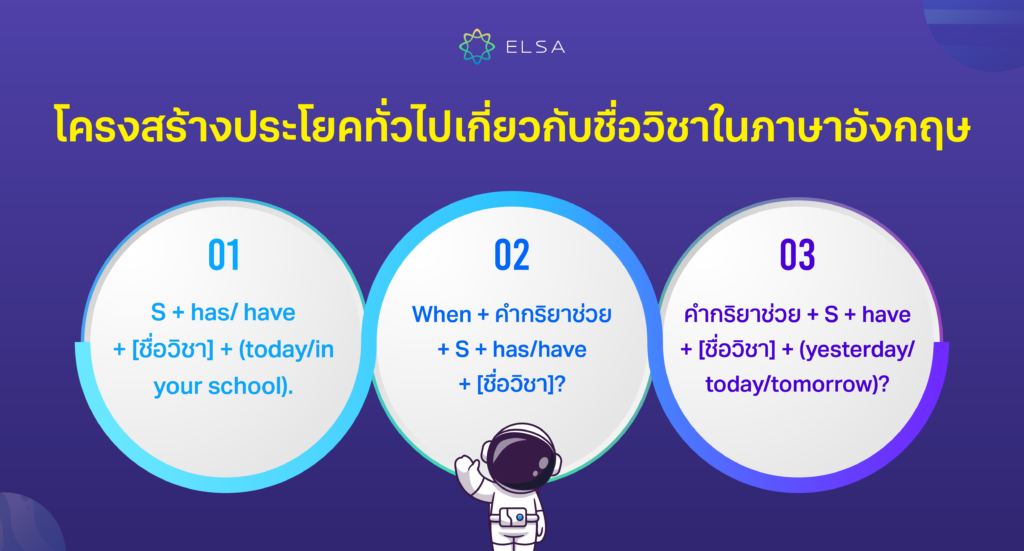
แบบฝึกหัดเกี่ยวกับวิชาภาษาอังกฤษ
เพื่อรวบรวมความรู้คำศัพท์วิชาภาษาอังกฤษ คุณสามารถดูแบบฝึกหัดดังต่อไปนี้
1. Some of the things you will learn when studying this subject are Adding, subtracting, multiplying and division
- Maths
- Literature
- Economics
- Biology
2. This subject is all about learning about different parts of the world.
A. History
B. Geography
C. English
D. Algebra
3. Things that make this subject one of the most popular are running, gymnastics and team sports.
A. Chemistry
B. Psychology
C. Media studies
D. Physical education
4. Learning about what has happened to the countries and cultures of the world is what this subject is all about.
A. Badminton
B. National Defense Education
C. History
D. Geometry
5. The study of composers, blue notes and concerto’s quavers are all included in…
A. Art
B. Biology
C. Civic Education
D. Music
เฉลย
| 1. A | 2.B | 3.D | 4.C | 5.D |
ฝึกฝนคำศัพท์ชื่อวิชาในภาษาอังกฤษกับ ELSA Speak
เพื่อพัฒนาคำศัพท์ชื่อวิชาในภาษาอังกฤษและหัวข้ออื่น ๆ การเข้าใจความหมายยังไม่เพียงพอ หากต้องการใช้และจำคำศัพท์ได้อย่างคล่องแคล่วต่อไปเรื่อยๆ คุณจะต้องเชี่ยวชาญการอ่านแต่ละคำแบบมาตรฐาน รวมถึงฝึกฝนผ่านประโยคหรือบทสนทนาสั้นๆ เป็นประจำ
ในการพัฒนาทักษะนี้ ELSA Speak จะเป็นผู้ช่วยที่ดีสำหรับคุณ นี่เป็นแอปพลิเคชั่นฝึกการพูดและการสื่อสารภาษาอังกฤษเพียงตัวเดียวในปัจจุบันที่สามารถแก้ไขข้อผิดพลาดในการออกเสียงได้อย่างแม่นยำในแต่ละพยางค์โดยใช้ปัญญาประดิษฐ์ (AI) ด้วยคุณสมบัติการจดจำเสียงพิเศษที่ได้รับการโหวตให้ติด 5 อันดับแรกของโลก ELSA Speak จะช่วยคุณตรวจจับข้อผิดพลาดระหว่างการฝึกและให้ข้อเสนอแนะทันทีเพื่อช่วยให้คุณปรับปรุงความสามารถในการพูดภาษาอังกฤษของคุณได้อย่างมีประสิทธิภาพ แอปพลิเคชั่นนี้ทำหน้าที่เป็นครูสอนพิเศษ ไม่เพียงแต่ให้คะแนนแบบฝึกหัด ให้คำแนะนำที่เหมาะสมเท่านั้นแต่ยังเตือนให้คุณสร้างนิสัยในการเรียนภาษาอังกฤษทุกวันอีกด้วย
ปัจจุบัน ELSA Speak ได้พัฒนา 192 หัวข้อ โดยมีบทเรียนมากกว่า 7,000 บท แบ่งออกเป็นแบบฝึกหัดมากกว่า 25,000 บท ด้วยเหตุนี้ คุณสามารถเลือกหัวข้อที่คุณชื่นชอบหรือเหมาะสมกับระดับส่วนตัวของคุณเพื่อสร้างความเป็นธรรมชาติในกระบวนการเรียนรู้ นอกจากนี้ ELSA Speak ยังมีการสนทนาตามหัวข้อแก่ผู้ใช้เพื่อปรับปรุงการออกเสียงและการตอบสนองเมื่อสื่อสารอีกด้วย
บทความนี้จึงได้รวบรวมคำศัพท์วิชาภาษาอังกฤษและโครงสร้างทั่วไปมักจะใช้ในหัวข้อต่างๆ หวังว่าการแบ่งปันข้างต้นของ ELSA Speak จะเป็นประโยชน์กับคุณในกระบวนการพัฒนาทักษะการสื่อสารภาษาอังกฤษนะ
Parallel Structure คือ อะไร? ในไวยากรณ์ภาษาอังกฤษโครงสร้างคู่ขนาน (Parallel Structure) ไม่ได้เป็นเพียงส่วนสำคัญทางไวยากรณ์ในการสอบเท่านั้น แต่ยังเป็นเครื่องมือที่จะช่วยให้ประโยคและการเขียนของคุณชัดเจนและเข้าใจง่ายขึ้นในสถานการณ์การสื่อสารหรือบทความในอนาคตทั้งหมด หลังจากเข้าใจความรู้เกี่ยวกับโครงสร้างคู่ขนาน (Parallel Structure) แล้ว ผู้เรียนต้องฝึกใช้และทำแบบฝึกหัดเป็นประจำจึงจะสามารถใช้งานได้อย่างคล่องแคล่ว ดังนั้นอย่าพลาดการแบ่งปันที่เป็นประโยชน์ในหัวข้อ Parallel structure สรุป นี้จาก ELSA Speak นะ!
Parallel Structure คืออะไร?
Parallel structure หรือ Parallelism ในภาษาอังกฤษไทยเรียกว่าโครงสร้างคู่ขนาน เป็นประโยคที่ประกอบด้วยองค์ประกอบหรืออนุประโยคตั้งแต่ 2 รายการขึ้นไปและมีโครงสร้างทางไวยากรณ์เหมือนกัน ช่วยทำให้ประโยคมีความสมดุล สอดคล้องกันและเข้าใจง่ายขึ้น
อย่างไรก็ตาม หากใช้โครงสร้างคู่ขนานไม่ถูกต้อง อาจส่งผลให้ขาดความชัดเจนด้านความหมายและทำให้ผู้อ่านเข้าใจความหมายได้ยาก ดังนั้นการมีความประณีต เป็นธรรมชาติ และใช้โครงสร้างคู่ขนานที่ถูกต้องจะช่วยเพิ่มความสวยงามและประสิทธิภาพให้กับงานเขียน
Parallel structure ตัวอย่างประโยค :
- Ryan likes swimming, hiking, and riding a motorcycle. (ไรอันชอบว่ายน้ำ เดินป่า และขี่มอเตอร์ไซค์)
- I went home, took a shower, changed my clothes and ate some lunch. (ฉันกลับบ้าน อาบน้ำ เปลี่ยนเสื้อผ้า และกินข้าวกลางวัน)
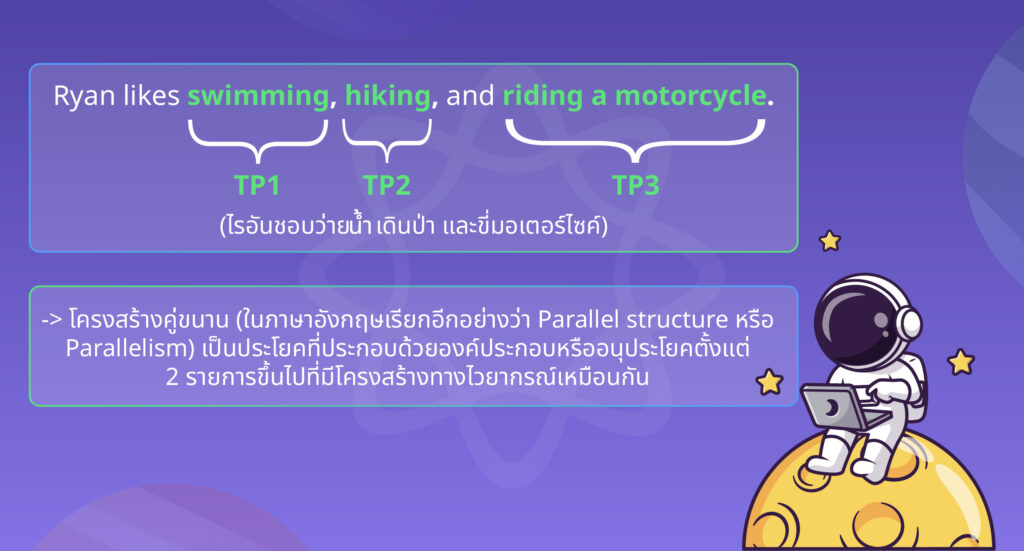
บทบาทของโครงสร้างคู่ขนาน (Parallel Structure) ในประโยค
เมื่อใช้โครงสร้างคู่ขนาน (Parallel Structure) ในการสื่อสารและในการทดสอบ IELTS Writing เราจะเห็นบทบาทของโครงสร้างนี้อย่างชัดเจน ได้แก่:
- เพิ่มความสม่ำเสมอและประสิทธิภาพในการถ่ายทอดข้อมูลของบทความ
- เน้นข้อมูลที่สำคัญและเกี่ยวข้อง
- สื่อสารประโยคที่เปรียบเทียบและตัดกันในลักษณะที่เข้าใจง่าย
- จำกัดการใช้คำซ้ำ ช่วยให้ประโยคดูสวยงามและมีตรรกะมากขึ้น
Parallel structure การใช้อย่างไร?
| วิธีการใช้ | อธิบาย | ตัวอย่าง |
| ใช้คำสันธาน coordinating conjunctions | ใช้คำสันธาน เช่น and for nor yet so or หรือ but เพื่อเชื่อมโยงองค์ประกอบที่ขนานกันสองรายการขึ้นไปในประโยค | The car is fast and reliable. (รถเร็วและเชื่อถือได้) We can go to the park or the beach. (เราจะไปสวนสาธารณะหรือชายหาดก็ได้) She wanted to buy a dress but ended up getting a pant instead. (เธออยากจะซื้อชุดเดรสแต่กลับได้กางเกงแทน) |
| ใช้คำสันธาน correlative conjunctions | ใช้ either…or neither…nor both… and… would rather… than…, whether… or… no sooner… than… hardly… when… และ not only but also เพื่อเชื่อมโยงองค์ประกอบที่ขนานกันในประโยค | She is either going to Paris or Rome for her vacation. (เธอจะไปปารีสหรือโรมเพื่อพักผ่อน) He can neither sing nor dance well. (เขาร้องเพลงและเต้นไม่เก่งเลย) Not only is she smart, but she is also kind and generous. (เธอไม่เพียงแค่ฉลาดแต่เธอยังใจดีและใจกว้างอีกด้วย) |
| ทำซ้ำรูปแบบไวยากรณ์ที่เหลือในประโยค | เมื่อใช้โครงสร้างประโยคคู่ขนานมักจะถูกเชื่อมด้วยคำสันธานหรือคำนามที่ใช้ในประโยคต้องมีรูปแบบเดียวกัน | I need to clean the house, do the laundry, and wash the dishes. (ฉันต้องทำความสะอาดบ้าน ซักผ้าและล้างจาน) |
| โครงสร้างเปรียบเทียบ | เมื่อคุณต้องการเปรียบเทียบสองสิ่งหรือมากกว่านั้น คุณสามารถใช้โครงสร้างการเปรียบเทียบเพื่อช่วยทำให้ประโยคมีความสมดุลและกระชับมากขึ้น โครงสร้างนี้มักปรากฏในการเปรียบเทียบหรือการเปรียบเทียบขั้นกว่า | She swims faster than she runs. (เธอว่ายน้ำเร็วกว่าวิ่ง) The new computer is as good as the old one, with the added advantage of being smaller. (คอมพิวเตอร์เครื่องใหม่นั้นดีเท่ากับเครื่องเก่า โดยมีข้อดีเพิ่มเติมคือมีขนาดเล็กลง) |
| โครงสร้างเมื่อใช้กับคำกริยา To-be | ในกรณีที่คุณต้องการเน้นมุมมองของคุณหรือเน้นความเชื่อมโยงระหว่างสองประโยค คุณสามารถใช้โครงสร้างคู่ขนาน (Parallel Structure) และเชื่อมโยงอนุประโยคผ่านคำกริยา to-be ได้ | To dream is to envision a better future. (การฝันคือการจินตนาการถึงอนาคตที่ดีกว่า) To listen is to understand deeply. (การฟังคือการเข้าใจอย่างลึกซึ้ง) |
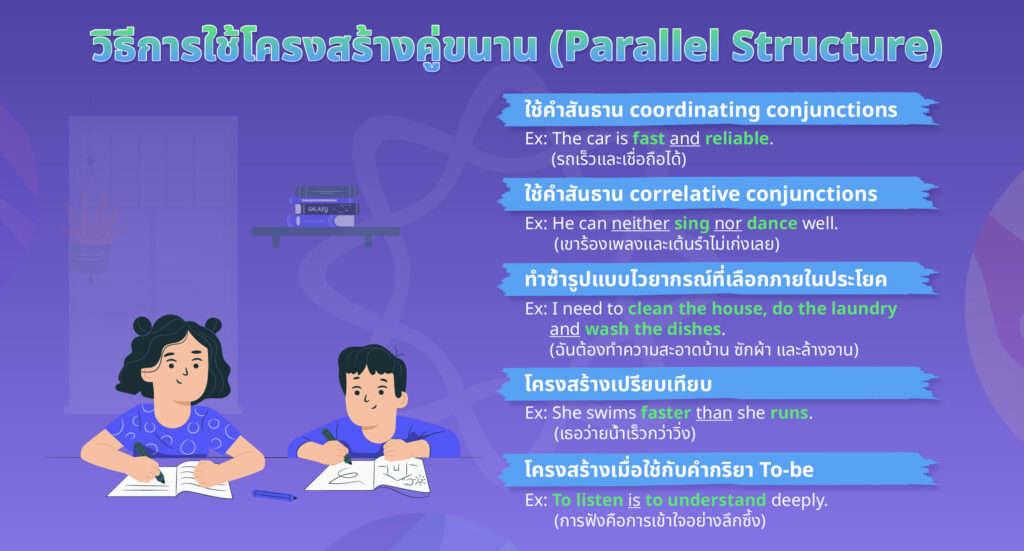
>>> Read more:
| การเรียนรู้เรื่อง conjunction อย่างละเอียดในบทความนี้ จะช่วยให้คุณแยกแยะรูปแบบต่าง ๆ ของคําเชื่อมภาษาอังกฤษได้ พร้อมมีแบบฝึกหัดเพิ่มเติมเพื่อพัฒนาทักษะภาษาอังกฤษของคุณ ไปเรียนรู้กันเลยค่ะ! |
บริบทที่ใช้ในโครงสร้างคู่ขนาน (Parallel Structure)
โครงสร้างคู่ขนาน (Parallel Structure) สามารถนำมาใช้ได้อย่างยืดหยุ่นในการเขียนเชิงวิชาการในสถานการณ์ต่างๆ เช่น เมื่อสร้างประโยค การสรุปแนวคิดตามลำดับ หรือจัดเรียงข้อมูลเป็นชุด ซึ่งจะช่วยสร้างสมดุลและการเชื่อมโยงในเนื้อหาที่เป็นลายลักษณ์อักษรและช่วยให้ผู้อ่านเข้าใจความสัมพันธ์ระหว่างรายละเอียดที่กล่าวถึงได้ง่าย ด้านล่างนี้คือสถานการณ์เฉพาะบางประการที่ผู้เรียนสามารถใช้โครงสร้างคู่ขนาน (Parallel Structure) ได้:
| บริบท | อธิบาย | ตัวอย่าง |
| สร้างรายการหรือชุดข้อมูล | ไม่ว่าประโยคจะเป็นคำนาม วลี หรืออนุประโยค ควรใช้รูปแบบไวยากรณ์เดียวกันเพื่อให้เกิดความคล้ายคลึงกัน โดยรักษาข้อมูลให้ชัดเจนและกระชับ | She enjoys reading books, watching movies, and listening to music. (เธอชอบอ่านหนังสือ ดูหนัง และฟังเพลง) |
| สร้างการเปรียบเทียบ | การเปรียบเทียบระหว่างสองสิ่งที่แตกต่างกันขึ้นไปควรใช้โครงสร้างเปรียบเทียบเพื่อสร้างประโยคที่สมดุลและกระชับ | The book is both more engaging and more informative than the movie. (หนังสือเล่มนี้ทั้งน่าสนใจและให้ความรู้มากกว่าภาพยนตร์) |
| ใช้คำสันธาน | เมื่อใช้คำสันธาน เช่น “and” “or” เพื่อเชื่อมโยงแนวคิดหรือวลีที่เกี่ยวข้อง โครงสร้างคู่ขนาน (Parallel Structure) จะเชื่อมโยงความคิดที่ชัดเจนและมีประสิทธิภาพ คำสันธานขั้นสูงบางคำที่ผู้เรียนจะต้องให้ความสนใจ เช่น “either/or” ”neither/nor” ”both/and” ”not only/but also” หรือ ”whether/or”. | The team practiced not only in the morning but also in the afternoon. (ทีมได้ฝึกซ้อมไม่เพียงแต่ในตอนเช้าเท่านั้น แต่ยังรวมถึงในตอนบ่ายด้วย) |
| กำจัดคำซ้ำ | การใช้โครงสร้างคู่ขนาน (Parallel Structure) สามารถลดความยาวของข้อความและจำกัดการซ้ำของคำนามที่ทำหน้าที่กริยาที่คล้ายกัน | ประโยคที่ซ้ำกัน: John is a hardworking employee. He always completes his tasks on time and he never misses a deadline. ประโยคที่ไม่ซ้ำกัน: John is a hardworking employee who always completes his tasks on time and meets every deadline. (จอห์นเป็นพนักงานที่ขยันขันแข็งและทำงานให้เสร็จตรงเวลาและตรงตามกำหนดเวลาเสมอ) |

ข้อควรทราบเมื่อใช้โครงสร้างคู่ขนาน (Parallel Structure) เป็นภาษาอังกฤษ
ในการใช้โครงสร้างคู่ขนาน (Parallel Structure) บางครั้งคุณอาจใช้ผิด ซึ่งอาจส่งผลต่อความคิดของผู้อ่าน โดยเฉพาะอย่างยิ่งการลดความสำคัญของข้อความ ต่อไปนี้คือข้อผิดพลาดทั่วไปที่คุณต้องหลีกเลี่ยงเมื่อใช้โครงสร้างคู่ขนาน (Parallel Structure):
| ข้อควรทราบ | ประโยคที่ผิด | อธิบาย | ประโยคที่ถูกต้อง |
| ใช้กาลและโครงสร้างไวยากรณ์ประเภทเดียวกันในประโยค | Mary likes hiking, to bike and to run. | เมื่อแสดงกิจกรรมที่แมรีชอบ กิจกรรมเหล่านั้นจะต้องมีรูปแบบไวยากรณ์เหมือนกันข้อผิดพลาดในประโยคนี้คือ hiking เป็นกริยานาม ในขณะที่ to bike และ to run เป็นกริยารูปปกติที่มี to–> ทั้งหมดใช้กริยานามหรือกริยารูปปกติที่มี to | Mary likes hiking, biking and running. (แมรี่ชอบเดินป่า ปั่นจักรยาน และวิ่ง) |
| ระบุกริยาหลักของประโยคให้ถูกต้องเพื่อแบ่งกาลและประเภทของคำให้เหมาะสม | They can enjoy walking on the ground, to swim in the pool, and to eat in our restaurant. | ตามโครงสร้าง enjoy + V-ing กริยา “walk” ต้องเปลี่ยนเป็นรูปแบบ V-ing: enjoy walking on the ground ในขณะเดียวกัน “swim” และ “meal” ต้องเปลี่ยนเป็นกริยารูปแบบ V-ing. | They can enjoy walking on the ground, swimming in the pool and eating in our restaurant. (พวกเขาสามารถเพลิดเพลินกับการเดินเล่นบนพื้น ว่ายน้ำในสระ และรับประทานอาหารในร้านอาหารของเรา) |
| ใช้คำนามประเภทเดียวกันในประโยค คุณต้องใช้คำนามประเภทเดียวอย่างสม่ำเสมอ เช่น พหูพจน์ เอกพจน์ นับได้ นับไม่ได้… | Fruits like oranges and a lemon can add a lot of vitamin C for us. | มีส้มมากมายแต่มะนาวเพียง 1 ผล -> ประโยคไม่สมเหตุสมผล-> ในประโยค ควรใช้คำนามประเภทเดียวเท่านั้น | Fruits like oranges and lemons can add a lot of vitamin C for us.(ผลไม้เช่นส้มและมะนาวสามารถเพิ่มวิตามินซีให้กับเราได้มาก มาย) |
| ต้องใช้ประธานในประโยคอย่างสม่ำเสมอ | June decided to write a letter for her pen friend, and had spaghetti for dinner. | การกระทำทั้งสองข้างต้นไม่เกี่ยวข้องกันหรือขึ้นอยู่กับความหมายซึ่งกันและกัน ทำให้เกิดความสับสนในการสื่อสารได้ง่าย | June decided to write a letter for her pen friend, and after that she had spaghetti for dinner. (จูนตัดสินใจเขียนจดหมายให้เพื่อนด้วยปากกาของเธอ และหลังจากนั้นเธอก็กินสปาเก็ตตี้เป็นมื้อเย็น) |
| ให้ความสนใจกับรูปแบบของคำที่มาก่อน “prefer” | I prefer going by motorbike to bike. | สำหรับคำ “prefer” ต้องทราบว่าคำที่อยู่ก่อนและหลังคำว่า “to” ต้องแบ่งเป็นรูปแบบเหมือนกันเสมอ: คำที่อยู่ก่อน “to” คือ “going by motorbike” (V-ing + by + คำนาม) ด้านหลังต้องมีคำ/วลีที่มีรูปแบบโครงสร้างเดียวกัน | I prefer going by motorbike to going by bike. (ฉันชอบเดินทางด้วยมอเตอร์ไซค์มากกว่าขี่จักรยาน) |
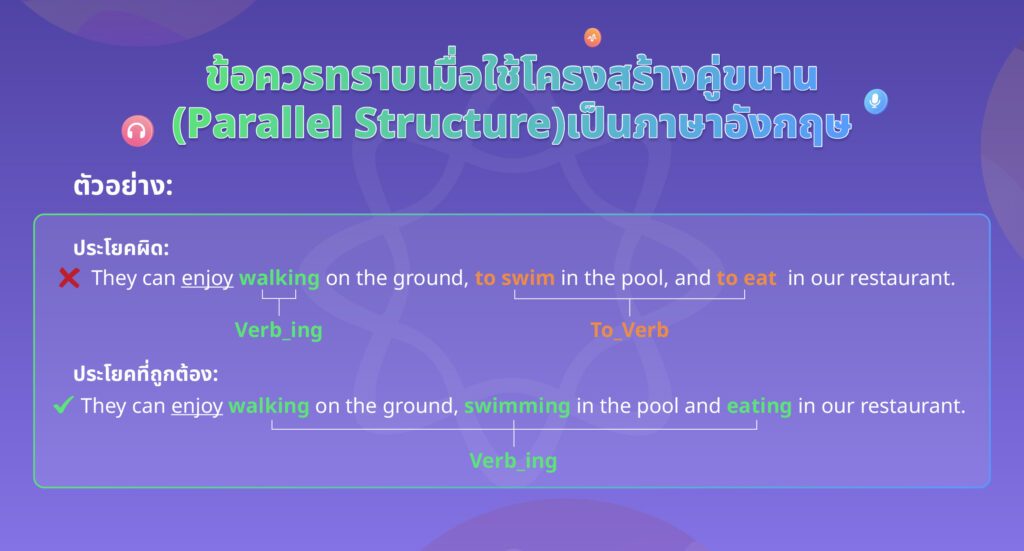
แบบฝึกหัด parallel structure พร้อมเฉลย
แบบฝึกหัดที่ 1: จงเขียนประโยคต่อไปนี้ใหม่โดยใช้โครงสร้างคู่ขนาน (Parallel Structure) เพื่อสื่อความหมายให้ชัดเจนยิ่งขึ้น
- Eggs contain not only protein but are also full of vitamins.
………………………………………………………………………………………..
- They are low in sodium but do not have many calories. ………………………………………………………………………………………..
- Eggs, however, are high in cholesterol and rather fat filled.
………………………………………………………………………………………..
- The yolk of one egg contains 213 milligrams of cholesterol and there are 5 grams of fat.
………………………………………………………………………………………..
- Still, the whites are both fat-free and have no cholesterol.
………………………………………………………………………………………..
แบบฝึกหัดที่ 2: เลือกคำที่เหมาะสมลงในช่องว่าง
- Not only does she enjoy ………. (read) novels, but she also likes ………. (view) films and listening to music in her leisure time.
- We can opt to either ………. (dine) at the bistro, ………. (prepare) a meal at home or ………. (order) takeout for lunch.
- My closest friend and I enjoy ………. (hike) in nature, ………. (capture) moments with our cameras and ………. (discover) new destinations together.
- We enjoy both ………. (watch) films and ………. (prepare) meals together during family gatherings.
- The corporation concentrates on ………. (develop) novel products, ………. (enhance) customer service and ………. (extend) into fresh markets.

ELSA Premium Lifetime
9,999 บาท ->6,439 บาท

ELSA Pro Lifetime
3,659 บาท ->2,799 บาท

ELSA Premium 1 year
8,497 บาท ->2,885 บาท

ELSA Pro 1 year
2,499 บาท ->1,528 บาท
เฉลย:
แบบฝึกหัดที่ 1: จงเขียนประโยคต่อไปนี้ใหม่โดยใช้โครงสร้างคู่ขนาน (Parallel Structure) เพื่อสื่อความหมายให้ชัดเจนยิ่งขึ้น
- Eggs contain not only protein but also vitamins.
- They are low in sodium but high in calories.
- Eggs, however, are high in cholesterol and in fat.
- The yolk of one egg contains 213 milligrams of cholesterol and 5 grams of fat.
- Still, the whites are both fat-free and cholesterol-free.
แบบฝึกหัดที่ 2: เลือกคำที่เหมาะสมลงในช่องว่าง
1. reading, viewing
2. dining, preparing, ordering
3. hiking, capturing, discovering
4. watching, preparing
5. developing, enhancing, extending
บทความนี้ได้แบ่งปันความรู้เกี่ยวกับ parallel structure คือ อะไร? วิธีใช้โครงสร้างคู่ขนาน (parallel structure) บริบทการใช้งานเฉพาะ การแยกแยะและระบุข้อผิดพลาดทั่วไปเมื่อนำโครงสร้างนี้ไปใช้ อย่าลืมมาฝึกฝนกับ ELSA Speak กันนะ!
ELSA Speak จะมาสรุปคำศัพท์ที่เกี่ยวข้องกับ ห้องน้ำ ภาษาอังกฤษ และคำถามที่พบบ่อย หวังว่าบทความนี้จะช่วยให้คุณจำคำศัพท์ภาษาอังกฤษเกี่ยวกับห้องน้ำได้มากขึ้นเพื่อนำมาใช้ได้อย่างเป็นธรรมชาติและยังเพิ่มคลังคำศัพท์ของคุณอีกด้วย
ห้องน้ำ ภาษาอังกฤษ คืออะไร?
- ห้องน้ำ ภาษาอังกฤษ คือ Bathroom
- การออกเสียง: /ˈbɑːθ.ruːm/ หรือ /ˈbɑːθ.rʊm/
- ตามคำจำกัดความของเคมบริดจ์ Cambridge bathroom คือ: a room with a bath and/or shower and often a toilet แปลเป็นภาษาไทยมีความหมายว่า ห้องที่มีอ่างอาบน้ำหรือฝักบัวและโดยปกติจะเป็นห้องน้ำ
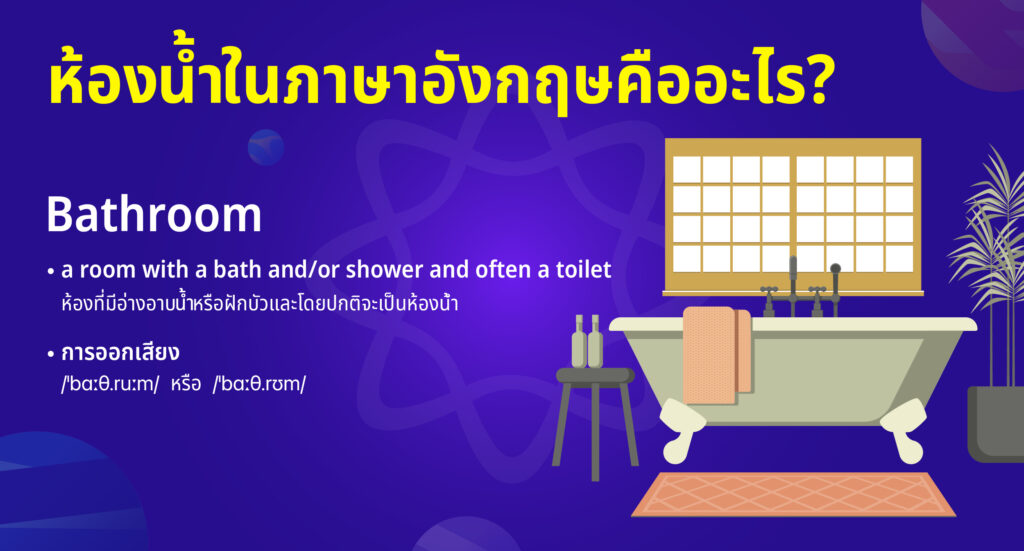
ห้องน้ำในภาษาอังกฤษมีคำอะไรบ้าง
| คำศัพท์ | วิธีใช้ |
| bathroom | ชื่อเรียกพื้นที่ซักล้าง ห้องน้ำ… |
| restroom | มักใช้ในพื้นที่สาธารณะ เช่น ซุปเปอร์มาร์เก็ต ร้านอาหาร เครื่องบิน… |
| toilet | ใช้ในบริบทของห้องน้ำ (โถส้วม) ที่นิยมใช้ในสหราชอาณาจักรและออสเตรเลีย |
| lavatory | คำที่เป็นทางการมักใช้บนเครื่องบินและในที่สาธารณะ |
| washroom | ที่ใช้กันทั่วไปในแคนาดาและบางแห่งในสหรัฐอเมริกา |
| loo | คำไม่สุภาพ ใช้กันอย่างแพร่หลายในอังกฤษ |
| WC | ได้เขียนย่อจากคำ water closet ที่ใช้กันทั่วไปในสหราชอาณาจักรและบางประเทศในยุโรป |
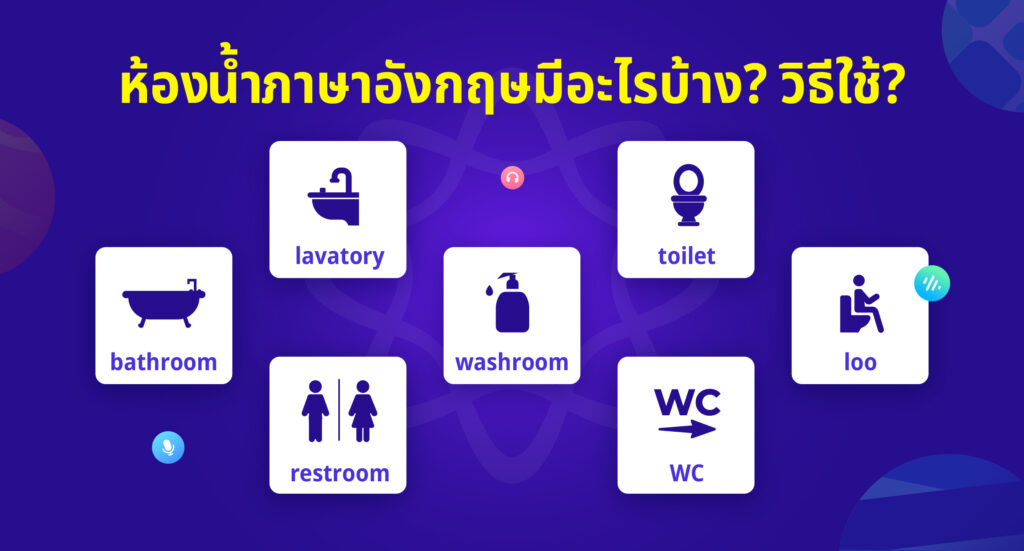
คําศัพท์ห้องน้ำ ภาษาอังกฤษ
คำศัพท์เกี่ยวกับสิ่งของในห้องน้ำ
| ภาษาอังกฤษ | แปล |
| Toilet | ชักโครก |
| Bidet | อ่างใส่น้ำและล้างก้น (ใช้เพื่อล้างร่างกายส่วนล่าง) |
| Toilet paper | กระดาษชำระ |
| Toilet brush | แปรงขัดชักโครก |
| Plunger | เครื่องมือสำหรับดูดท่อชักโครก |
| Sink | อ่างแปรงฟัน ล้างหน้า |
| Faucet/tap | ก๊อกน้ำล้างหน้าในห้องน้ำ |
| Shower | ฝักบัว |
| Shower head | หัวฝักบัว |
| Shower curtain | ม่านในห้องน้ำ |
| Shower screen | ฉากกั้นอาบน้ำ |
| Bathtub | อ่างอาบน้ำ |
| A cubicle | พื้นที่แบ่งกั้นเล็กๆ |
| Double-hung window | หน้าต่างบานเลื่อนคู่ |
| Mirror | กระจก |
| Curtain | ม่าน |
| Bath mat | พรมเช็ดเท้า |
| Soap dish | แท่นวางสบู่ |
| Wastepaper basket | ตะกร้าใส่ขยะ |
| Curling iron | โรลม้วนผม |
| Hair dryer | เครื่องเป่าผม |
| Sanitary towels | ผ้าอนามัย |
| Tweezers | แหนบ |

คำศัพท์เกี่ยวกับของใช้ส่วนตัวในห้องน้ำ
| ภาษาอังกฤษ | แปล |
| Soap | สบู่ |
| Shampoo | แชมพูสระผม |
| Conditioner | ครีมนวดผม |
| Toothbrush | แปรงสีฟัน |
| Toothpaste | ยาสีฟัน |
| Mouthwash | น้ำยาบ้วนปาก |
| Razor | มีดโกน |
| Electric razor | มีดโกนหนวดไฟฟ้า |
| Shaving cream | ครีมโกนขน |
| Dental floss | ไหมขัดฟัน |
| Lotion | ครีมทาตัว |
| Perfume | น้ำหอม |
| Q-tip | ยี่ห้อไม้ปั่นหู |
| Cotton balls | สำลีก้อน |
| Comb | หวี |

คำถามภาษาอังกฤษที่ใช้บ่อยในการถามเกี่ยวกับห้องน้ำ
| ภาษาอังกฤษ | ภาษาไทย |
| Could you tell me where the bathroom is, please? | ฉันขอถามหน่อยว่าห้องน้ำอยู่ที่ไหนคะ? |
| Where are the toilets, please? | ขอโทษนะคะ ห้องน้ำอยู่ที่ไหนคะ? |
| Where are the ladies’/gents’, please? | ขอถามหน่อยว่าห้องน้ำหญิง/ชายอยู่ที่ไหนคะ/ครับ |
| Pardon me, but could you please direct me to the restroom? | ฉันขอถามได้ไหมว่าห้องน้ำอยู่ที่ไหนคะ? |
| Can you please inform me of the location of the bathroom? | ขอรบกวนหน่อยค่ะ ห้องน้ำอยู่ไหนคะ? |
| Are there any public toilets nearby, please? | ฉันสงสัยว่ามีห้องน้ำสาธารณะแถวนี้ไหมคะ? |
คำถามที่พบบ่อย
ห้องน้ำหญิง ภาษาอังกฤษ คืออะไร
ห้องน้ำหญิง ภาษาอังกฤษคือ Ladies’ room / Powder room
ห้องน้ำชาย ภาษาอังกฤษ คืออะไร
ห้องน้ำชาย ภาษาอังกฤษคือ Men’s room
ห้องน้ำ ภาษาอังกฤษ คําอ่าน คืออะไร
ห้องน้ำในภาษาอังกฤษมีคําอ่านว่า Bathroom /ˈbɑːθ.ruːm/ หรือ /ˈbɑːθ.rʊm/
ในบทความนี้ ELSA Speak ได้สรุปคำศัพท์ ประโยคคำถาม และวิธีแยกแยะคำศัพท์หัวข้อห้องน้ำในภาษาอังกฤษมาฝากทุกคนหวังว่าคุณจะจำคำศัพท์เหล่านี้ได้อย่างถูกต้องเพื่อที่คุณจะได้นำไปใช้ในยามจำเป็นนะ

